In par tnership with






 ISLAMABAD AhmAd AhmAdAni
ISLAMABAD AhmAd AhmAdAni
Pakistanand Russia have reached an agreement to establish working groups to enhance cooperation in a number of fields including oil and gas. the significant decision happened on the second day of talks at the eighth Pakistan-Russia intergovernmental Commission (iGC) session in islamabad.
the three-day meeting is a culmination of efforts between the two countries to establish relations regarding energy which began with a visit to Russia by petroleum minister Musadiq Malik. at thursday’s meeting, an agreement was reached to form working groups to look into ways and means of exploring new opportunities for strengthening the bilateral relations.
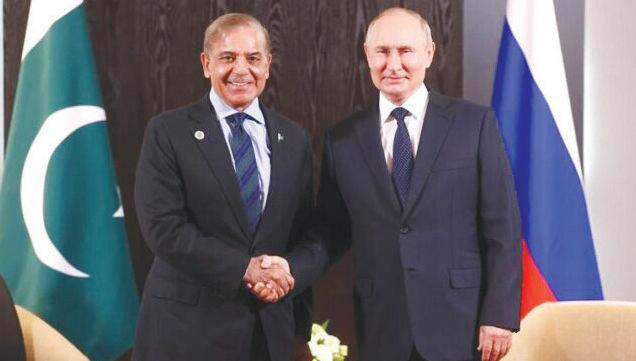
Minister of Energy of the Russian Federation nikolay shulginov and Minister for Economic affairs sardar ayaz sadiq led their respective sides on thursday and they both will announce major decisions of the commission (iGC) on Friday, said sources. they added that signing of agreements in different fields will take place on Friday which will strengthen the bilateral relations of the two countries.
“On second day of the Pak-Russia iGC, the delegation-level talks focused on energy, oil and gas, agriculture, customs, trade, investment, industry, education and science and technology sectors while both sides also discussed cooperation in communications, postal services and railway sectors and reiterated the desire to advance cooperation in the energy sector,” said sources.
they added that Russia expressed willingness to provide training to Pakistani manpower while detailed discussions were also held on the construction of
karachi to Lahore gas pipeline, gas transit route etc. and the Russian side also offered that Pakistan can take benefit from their experience in science and technology and research fields. “the Russian delegation also stressed the need that Pakistan should accelerate its efforts in research and science and technology sectors,” said the sources.
as per sources, the Russian side observed that the energy sector was the main focus because its Energy Minister nikolai shulginov was himself leading the negotiations and the two sides decided to move forward together in the field of energy, and Pakistan would get the benefit of Russian expertise in the oil and gas sector. though Russia is not part of the turkmenistan-Pakistan-afghanistan and india (taPi) gas pipeline projects, however, Russian
Energy
it is also learnt from sources that on the last day of 8th Pak-Russia iGC meeting, there would be a main discussion on the implementation of the gas pipeline construction project titled “the Pakistan stream Gas Pipeline (PsGP),” oil and petroleum products delivery to Pakistan, Russian-Pakistani financial cooperation, implementation of the decisions and recommendations of the seventh meeting of the commission, besides cooperation in different sectors, before signing of the final protocol. as per details available with Profit on Pakistan-Russia bilateral trade relations, the total bilateral trade between Pakistan and Russia stood at UsD 581.7 million (Exports: UsD 124.4 million & imports: UsD 457.3 million) in the year 2021-22.
Responding to islamabad’s desire to normalise bilateral ties with its nuclear-armed neighbouring country, india has yet again set a condition before resuming talks with Pakistan. “india reiterated its position on relations with Pakistan and said that a ‘conducive atmosphere free of terror’ is needed for talks,” state-run ani quoted the indian foreign ministry’s spokesperson as saying on thursday. Replying to a question during a press briefing arindam Bagchi, the indian foreign ministry’s spokesperson, said: “We have already said that we have always wanted normal neighbourly relations with Pakistan.” He added, “But there should be a conducive atmosphere which does not have terror, hostility or violence. that remains our position.” the comments came four days after Prime Minister shehbaz sharif, during an interview with al arabiya news channel, asked his indian counterpart narendra Modi to hold “serious and sincere talks” — to resolve the burning issues with new Delhi, including indian illegally Occupied Jammu and kashmir (iiOJk). “My message to the indian leadership and Prime Minister narendra Modi is that let us sit down [at] the table and have serious and sincere talks to resolve our burning issues like kashmir,” the premier said. PM shehbaz said that flagrant human rights violations were taking place day in and day out in iiOJk, adding that the neighbouring country had usurped any semblance of autonomy given to kashmiris according to article 370 of the indian Constitution. the autonomy was revoked in august 2019. the premier also said that the minorities in india “are being persecuted”. “this must stop so that message can go around the globe that india is ready to have talks.” PM shehbaz said Pakistan and india “are neighbours and have to live with each other”. the ties between the two nuclear-armed nations halted in 2019 after the Modi administration revoked the special status of iiOJk and has since been continuing its unabated terrorism in the Himalayan valley. islamabad and new Delhi in november 2003 agreed to a ceasefire along the Line of Control (LoC) and the Working Boundary, but the truce was breached repeatedly after Modi came into power in 2014. Foreign Office spokesperson Mumtaz Zahra Baloch earlier this week told journalists that Pakistan would welcome United states’ facilitation in the resolution of the Jammu and kashmir dispute. “Regarding the Pakistan–india relations and the facilitation by third parties, including the United states, Pakistan has always said that we would welcome the international community to play their role in promoting peace in the region including in facilitating dialogue and resolution of the core dispute between Pakistan and india i.e. the Jammu and kashmir dispute,” she said.
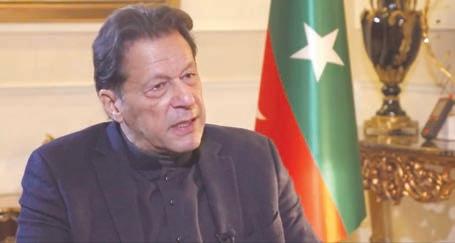 LAHORE
LAHORE
Pakistan tehreek-e-insaf (Pti) Chairman imran khan thursday made it clear that any delay in the elections would not be tolerated come what may, elaborating on that only a caretaker setup comprising well-reputed and able people could perform this important task in a befitting manner.
talking to members of Pti Parliamentary Committee, who called on him at Zaman Park in Lahore on thursday, the Pti Chairman said that Pti was nominating personalities of best reputation, ability and impeccable credentials.
Pti Central senior Vice President Fawad Chaudhry was also present in the meeting.
During the meeting, the Pti Chairman vowed that the jeopardizing the transparency of the elections would be tantamount to enmity with the country. in the meeting, they held detailed
consultation on important issues regarding nomination of Caretaker Chief Minister in Punjab.
they also discussed names of ahmed nawaz sukhera, former Punjab Chief secretary naveed Cheema and naseer khan for caretaker chief minister in detail.
it was said that after the final consultation, Chairman Pti would send two names to the parliamentary committee. the Pti chairman said that the country cannot afford any delay in the elections, adding that holding free, fair and transparent elections was the most serious matter and only the caretaker government with the best reputation and capacity could perform this responsibility in the best possible manner.
imran khan said that Pti was nominating people of best repute for the important position. He said that it would be foolishness to allow the group afraid to face the public to do more wrongs.
He said that the constitutional requirement to establish caretaker governments should be fulfilled seriously so as the people could be given the right to make decisions through elections without any further delay.
Earlier in the day, Punjab assembly speaker sibtain khan formed a six-member parliamentary committee for finalising the nomination for the caretaker Punjab chief minister (CM) post.
the parliamentary committee was formed in pursuance of letters written to the Punjab assembly speaker by the Opposition Leader Hamza shehbaz and Chief Minister Pervaiz Elahi.
the committee members include Malik ahmed khan, Hassan Murtaza, nadeem kamran, Mian aslam iqbal, Raja Basharat and Makhdoom Hashim Jawab Bakht. the issue of the nomination of the caretaker chief minister of Punjab was referred to the parliamentary committee after the ruling alliance
and opposition failed to finalised caretaker CM Punjab.
after dissolution of the Punjab assembly, consultations between the ruling Pti and PML-Q, and the opposition Pakistan Muslim League nawaz (PMLn) are underway for appointment of the caretaker chief minister.
Opposition leader Hamza shehbaz has sent names of syed Mohsin Raza naqvi and ahad Raza Cheema to Pun-
StAff RepoRt jab governor for appointment as the caretaker chief minister of Punjab. the Pti-PMLQ has finalized three names for the caretaker Punjab CM. the names included Cabinet secretary ahmad nawaz sukhera, former health minister naseer khan and former chief secretary nasir saeed khosa. ISLAMABAD StAff RepoRtPower prices set to be cut by Rs2.19 per unit under Dec 2022 adjustment
World Bank debunks news about delay in $1.1bn loan to Pakistan
Cold storage owners hint at fruit, vegetable shortage
Top ministers say Pakistan firm to revive IMF programmae
g Both countries agree to form working groups to enhance cooperation in diverse fields
tHEFree and Fair Election Network (Fafen) said on Thursday that the Election Commission of Pakistan needs to open up to political actors and address their legitimate concerns. It further stated that the controversies regarding the quality of the electoral process in the recently held Sindh
local government polls “do not augur well”, especially when political parties are preparing for general elections.
In an observation report, Fafen noted that many controversies in the LG polls stemmed from weaknesses in the legislative framework that governed elections, adding that these needed to be rectified through negotiations among all political actors.
“Unless elections lead to political
stability, the process of democratisation will continue to weaken and so will the public trust in democracy and its ability to improve the social and economic well-being of the people,” the report said.
The report further noted that an “impressive number” of voters turned up in Badin, Jamshoro, Tando Muhammad Khan, Tando Allah Yar, Thatta, and Malir district while the turnout in Karachi Central, Karachi
East, Karachi West, Karachi South, Korangi, Hyderabad, and Kemari districts was “relatively low”.It also noted that the voting process remained orderly, unlike the first phase of the LG polls. However, it added that legal and procedural irregularities concerning campaigning inside and around polling stations, and the ballot issuance process were observed during the first phase persisted during the second as well.
“Fafen observers noted omissions and inadequacies in the polling station result forms (Form 11) recurring during the second phase. They reported cases where presiding officers did not duly fill out the result forms leaving empty sections made for recording polling stations’ names, registered voters, genderdisaggregated number of votes polled, and signatures of polling officials.” The report recommended ensuring stricter enforcement of the code of conduct regarding campaigning and canvassing on election day, setting up adequately spaced polling booths, compliance with the voter identification and ballot issuance processes, availability of female staff at female polling booths, and provision of basic facilities at polling stations before the general elections to improve polling day management.
The United States government has expressed its support for Pakistan’s efforts to achieve economic sustainability, according to State Department spokesperson Ned Price.
In a press briefing, Price acknowledged Pakistan’s ongoing negotiations with the International Monetary Fund (IMF) and other global financial institutions. “We want to see Pakistan in an economically sustainable position,” said Price. “We are supportive where we can be of our Pakistani partners, but ultimately these are conversations between Pakistan and international financial institutions.” He also noted the US government is closely monitoring Pakistan’s dwindling foreign exchange reserves, which he described as a “challenge.”
The comments come a day after the State Bank of Pakistan (SBP) governor, Jameel Ahmad, said the nation will see dollar inflows in the coming days after funding commitments from the Middle East, a move that could bolster finances for the cash-strapped government, according to a Bloomberg report. The central bank’s biggest strain is limited resources, Ahmad said at an event hosted by the Karachi Chamber of Commerce and Industry (KCCI). He also said the central bank used to intervene in the interbank market in the past but it is not in a position anymore because of dwindling reserves.

Though the delegation of Pakistan in recently held Geneva donors’ conference included representatives of all provinces but no one from Gilgit Baltistan had attended the event for, what Chief Minister GB Muhammad Khalid Khurshid claimed, was a deliberate attempt of the center to sidelining the regional government. Addressing a press conference in Islamabad on Thursday, the chief minister revealed that Federal Minister of Planning Development and Special Initiatives Ahsan Iqbal, during an earlier briefing, had asked officials from GB to remain silent in Geneva. “My secretary was instructed that he will neither give any briefing nor take the name of Gilgit Baltistan in the Geneva conference,” the chief minister claimed, adding that no reason was given regarding keeping GB absent from the entire tour and presentation in the conference. “I could not understand the rationale and reason behind this move. This is why, while keeping the attitude of the center in view, I instructed the secretaries to avoid becoming part of the Geneva delegation,” he further revealed. According to him, despite being the most affected mountainous region in the country by climate change, not a single project of GB was included in the flood rehabilitation plan for which the international lenders have pledged around $ 10 billion soft loan.
Khalid Khurshid, who was also accompanied by former provincial minister of Khyber Pakhtunkhwa Taimur Saleem Jhagra and PTI leader Muzamil Aslam, said that the federal government has not released even one rupee extra for Gilgit-Baltistan. The regional government, he said, should have received Rs 22 to 23 billion in the form of ADP, but the federal government has kept the ADP to just Rs 18 billion. He claimed that the government of 13 political parties has cut not only development but also the non development budget of GB. It has also cut the wheat subsidy despite increasing demand as per growth in population in the area.
Pakistan Tehreek-e-Insaf (PTI) Central Secretary General Asad Umar said that the PTI rejected the mostrigged Local government (LG) elections held in Karachi and Hyderabad divisions, demanding the election watchdog to declare the elections null and void and announce fresh polls forthwith.
Addressing a press conference here on Thursday, he said that the Pakistan People’s Party (PPP) stole the public mandate in the LG polls of Karachi by use of force, coercion and intimidation, which the PTI would not accept in any way.
Asad said that rigging started on the morning of the election day as video posted on social media showed
Asad further said that the election staff was pressurized but the ECP
to conduction free, fair and transparent elections. He further said that Rabistan Khan exposed rigging in Manghopir, but the police arrested and tortured him.
He
on to say
Federal Minister for Climate Change, Senator Sherry Rehman on Thursday said that the geographies of vulnerability, those of us who live in warmer climates, are caught in a recovery trap. “We are at the ground zero of climate stress as we live in an era of accelerated climate change which leads to extraordinary human suffering. My worry is that despite excellent progress made at a climate resilient recovery conference, we may not be able to rebuild one-third of the country before the next disaster hits us.”
Federal Minister for Climate Change, Senator Sherry Rehman was speaking at the annual Pakistan Breakfast at Davos as the chief guest, organised by the Pathfinder Group. She thanked the organizers for arranging the event annually on the sidelines of the Annual Meeting in Davos, allowing Pakistani policymakers to share their insights with participants from all over the world in Davos, a news release here received said.
Unbundling the resilient recovery challenge @axios today.Developing countries like Pakistan face an accelerated onset of climate disasters before we can rehabilitate. What if this summer brings fresh horrors? We are in a race against
time. The minister praised the efforts of the Prime Minister and Foreign Minister for their leadership on the multilateral stage and exceeding the targets in Geneva during the Climate Resilient Pakistan conference, despite donor fatigue and other crises in the world.“It gave us a sense of how success can be achieved in times of extreme adversity, and what was a climate emergency. However, make no mistake because it is still a climate emergency in Pakistan, and we still have a lot of work ahead of us to bring the country back to its feet. The cameras have moved away, but the crisis prolongs. There are still 20 million people who need humanitarian assistance, and 8 million people are exposed to flood waters,” she said. The minister highlighted, “These disasters are not just acts of God, instead are the outcomes of prolonged anthropogenic activities – as these are man-made disasters and we shouldn’t deflect the responsibility by calling it an act of God alone.” The minister also spoke at a panel discussion titled ‘Investing in Nature’ organised by The Maryam Forum Foundation where she was joined by the Minister for International Cooperation of the Government of Egypt, Rania Mashat, President, Center for Global Development, Sir Masood Ahmed, Chief Economist, Asian Infrastructure Investment Bank, Erik Berglöf, and Chief Sustainability Officer, Mastercard, USA, Ellen Jackowski.
The Sindh High Court (SHC) on Thursday heard Muttahida Qaumi Movement-Pakistan’s (MQM-P) plea against recruitment of 90,000 vacancies in the province. At the outset of the hearing, Justice Junaid Ghaffar asked the MQM-P’s counsel why they are in hurry on the matter. Process for test has begun, the counsel replied after the SHC bench query and added that recruitment by the SIBA is ‘illegal’. The court accepted the plea for hearing. Earlier, Sindh High Court Sukkur Bench ordered to stop the recruitment process of Primary School Teachers (PST) and Junior Elementary School Teachers (JEST), who secured less than 40 percent marks in the test conducted by Institute of Business Administration (IBA) Sukkur. A two-member bench of the Sindh High Court Sukkur bench comprising Justice Sallahuddin Panhwar and Justice Abdul Mobin Lakho on Thursday heard the case on the application of the candidates neglected in the recruitment process. The petitioners’ counsel argued that those who had scored 40 to 55 marks were being ignored while candidates with less than 40 marks were being recruited.
Jamaat-e-Islami (JI) Karachi chapter chief Hafiz Naeemur Rehman said on Thursday that the next mayor of Karachi would be from the party, adding that “matters can move forward” if PPP and JI accept each other’s mandate. He expressed these remarks following a meeting with Pakistan People’s Party (PPP) delegation which included Saeed Ghani, Najmi Alam, Imtiaz Shaikh and others. Both parties discussed a possible agreement to elect the mayor of Karachi. JI apprised PPP of its concerns about the LG polls in the city, with the PPP assuring JI that its concerns would be addressed. In a press conference at Noor-e-Haq Institution in the metropolis flanked by PPP leaders after the meeting, Rehman said that four days had passed since the local government elections were conducted but the matter of results was still not over. He alleged that returning officers (RO) were appointed by certain parties to achieve desired results and that the “ROs were making rigging attempts.” Rehman further said that the LG polls were held after two and a half years after being postponed four times, adding that uncertainty was used to restrict people from voting The JI leader maintained that after so many efforts, the election that took place was also prone to problems and that the “government does not want to give power to the people”. Rehman stated that the party’s first demand is to order vote bags from the ROs for seats whose cases are being heard in the Election Commission of Pakistan (ECP). He said that calling for the recounting of votes is a right of any party but alleged that the PPP will take “advantage of this to increase their numbers”.

An Accountability Court on Thursday reserved verdict in a money laundering case against former president Asif Ali Zardari, Faryal Talpur and others.
Accountability Court Judge Nasir Javed Rana resumed the hearing on the money laundering case wherein Farooq H Naek, counsel for Asif Zardari told the court that his client is facing charges of corruption worth Rs30 million, which the National Accountability
Bureau (NAB) couldn’t prove yet. He informed the court that after the NAB amendments, this case does not fall under the jurisdiction of the NAB anymore.
Farooq H Naek requested the court to send back this reference to NAB. The court also accepted Asif Zardari, Faryal Talpur and other suspects’ pleas for one-day exemption from personal appearance.
Court aCquits Capt (r) safdar in two Cases: Meanwhile, a Civil Court on Thursday acquitted Captain (r) Safdar, the son-in-law of PML-N Supremo Nawaz Sharif, in two cases for allegedly
taking out rallies against the state institutions.
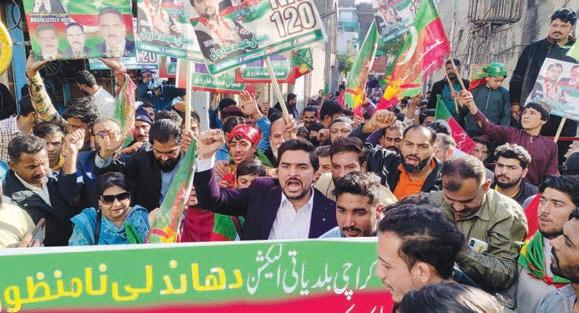
Civil Judge Imran Akram, while hearing the plea under Section 249/A of the Penal Code, ordered the acquittal of Captain Safdar in both cases. The cases had been registered against him at the Rawalpindi City Police Station in 2018.
Meanwhile talking to the media, Capt (r) Safdar Awan raised the question of what will Article-6 be imposed on those who derailed the PML N government, adding that characters like Justice Munir and Justice Irshad are still there.
lIKEother spheres of life, Balochistan continues to face dearth of quality human resources and the provincial government is indifferent to fill vacant posts while over hundred thousand educated youth seeking jobs every year remains unemployed.

Khalil Baloch, a job seeker from Jhal Magsi urged the provincial government to accelerate the recruitment process and provide jobs on merit to the unemployed youth as promised by the provincial government.
He expressed his concerns over the slow recruitment process in the provincial government departments as the recruitment in Agriculture Department was postponed
for the third time.
The agriculture department, he said had published an advertisement for some 1,184 jobs in various cadres for the third time. Over 50,000 youth applied for the said posts. Tests and interviews were conducted three times for recruitment, but the process was not completed, he added.
Baloch said that it appeared that the provincial government had placed its
scheme for providing employment on the back burner.
“This unemployment will continue to increase anxiety among the youth which should be taken seriously,” Khalil Baloch said.
Samrina Magsi, an Environmental Sciences graduate said the government should work hard to fill the vacuum and provide jobs to address the issue of unemployment in the province.

Confirming reports about expected return of Maryam Nawaz, her spouse Capt (r) Safdar Awan said on Thursday that Maryam Nawaz – the PML-N Vice President – will return to the country and her flight will land at Lahore Airport on 4:00pm on (Sunday).
Talking to media person here on Thursday, Capt (r) Safdar Awan claimed
that the PML-N activists have started preparations to accord a red carpet welcome of their leader Maryam Nawaz on her arrival back in the country. He said the party has started mobilization of the party workers and contact with other party leaders.
On the occasion, he launched a broadside against some former generals, saying, “Intervention in politics has inflicted irreparable loss to the country.
During the proceedings on Thursday, the government expressed concern that such disclosure could lead to “unnecessary media hype” and potentially damage Pakistan’s international relations. The government’s position was presented by Additional Attorney General Nasar Ahmed at the hearing, which was conducted by Justice Asim Hafeez. Ahmed provided the court with a written response from the government detailing Toshakhana rules and the government’s disclosure policy. The response stated that the Prime Minister’s Office had deemed information on Toshakhana gifts to be classified, as it could cause damage to Pakistan’s international relations. The government also argued that the Right of Access to Information Act, 2017 provided exemptions for information that could harm Pakistan’s international relations, as well as information that was considered private. Despite this, the government stated that the Prime Minister’s Office (PMO) has formed a committee to develop a new Toshakhana policy based on international best practices and transparency, and the recommendations and new policy are awaiting approval. Reacting to the government position, Fawad Chaudhry, senior vice president of Pakistan Tehreek-iInsaf (PTI), expressed surprise at the government’s response to the hearing, stating that the issue of Toshakhana gifts was a top priority for the government until recently, but now they seem to be trying to avoid transparency and potential exposure.
The Public Accounts Committee (PAC) on Thursday directed the authorities concerned of the National Heritage and Culture Division to conduct a fresh and proper Departmental Accounts Committee (DAC) to submit its report in the next coming meeting. Presiding over the meeting, Member National Assembly Noor Alam Khan apprised the committee that the National Heritage and Culture Division had not carried out the DAC for the last two years.
He blamed that former COAS’s intervention caused flour shortage in country. “Pervez Musharraf’s intervention inflicted irreparable loss to the country,” he said and added: “We will expose those judges and generals, who pushed Pakistan to the existing situation.” Capt Safdar said that Maryam Nawaz will return to Pakistan to expose those who had conspired against Pakistan.
According to earlier reports, PML-

N activists have started preparations for warm welcome of Maryam Nawaz on her returning back to the country.
Earlier, Punjab Governor Balighur Rehman said in a statement that former Prime Minister Nawaz Sharif is returning to Pakistan next month while Maryam is also arriving soon. It is pertinent to mention here that Maryam Nawaz has left for London in October last year after getting her passport back from the Lahore High Court (LHC).
She said the Prime Minister was not in favor of taking tax measures across the board that could put an extra burden on the poor and common people.
To a question, she did not give any date when to start talks with the IMF team but she said that the government was firm to go with the program after having a detailed workout. She said the government would try to convince the IMF about the worst situation in Pakistan after the disastrous floods last year. “The people are already suffering due to the disastrous flooding and they are not in a position to afford any further measures”. Earlier, briefing the Senate Committee on Finance she informed that Pakistan is going through an extraordinary situation.
A representative of the Pharmaceutical Manufacturing Association briefed the committee that the pharmaceutical industry has a potential of $6 billion. He said that this industry imports 93% of raw materials and the remaining 7 percent is also ordered from India, however, the LCs are 100% closed. He said that we have made advance payments but still the LCs are not open adding that all the banks are saying that they don’t have dollars.
Replying to a pharma representative, the State Minister said that you should not say such things on such a platform, adding that Pakistan is going through an extraordinary situation. Senate Standing Committee on Finance and Revenue met under the chairmanship of Senator Saleem Mandviwala.
Mrs. Pasha requested to understand that normal economic conditions cannot be provided yet and that we have inherited the current account deficit.
She said that we have given instructions to the banks to open necessary Letters of Credit (LC’s).
If LCs are not open, it does not mean that the country is going bankrupt, she added.
LCs related to essential food items, energy, pharmaceuticals exports, and agricultural products will be opened, she added.
The State Minister said that we are trying our best to increase foreign exchange reserves but it takes time. The Committee directed the State Bank to immediately open LCs in the pharmaceutical industry. The committee also consider the matter of Exemption of FED/Sales Tax to Industrial Traders of Ex-FATA and instructed the special secretary of finance to arrange a meeting with the state minister of the chamber of representatives.
‘Undaunted by disqualification threat’: Former prime minister and PTI Chairman Imran Khan has said they (PDM) are trying their best to disqualify him which is evident from so many court cases, rising with each passing day, but dispelled speculations that he could be disqualified, saying “there is absolutely no case that can disqualify me”.
“It is true there are so many cases registered against me and the “imported rulers” are trying their best to [twist some of them] in their favour and get me disqualified … but I don’t see any such thing,” the former premier said in an interview with BBC.
To a question as to who will head the party in case of his disqualification, Imran replied: “We will cross that bridge when we come to this [disqualification].”
Reiterating his demand for snap polls, the PTI chief reiterated that only free and fair elections could bring back stability in the country. “The way to stability goes through free and fair elections and it the only way out for Pakistan,” he said.
When asked why he is demanding polls only a few months earlier as it could further cause damage to economy, Imran said, “The damage has already been done and it’s only going to get worse the longer this government stays.”
“The worry in Pakistan is that we could have a Sri Lanka type situation,” he added The former prime minister is facing a slew of cases in the top courts, including the Toshakhana reference in which he is accused of unlawfully selling gifts from foreign dignitaries and heads of state for personal gain.
The PTI chairman is accused of misusing his 2018 to 2022 premiership to buy and sell gifts in state possession that were received during visits abroad and worth more than 140 million Pakistani rupees. The gifts included watches given by a royal family.
In October last year, the Election Commission of Pakistan disqualified the deposed premier, saying he had had “intentionally and deliberately” violated the provisions contained in sections 137, 167 and 173 of the Elections Act, 2017 as he submitted a “false statement” and “incorrect declaration” in the details of his assets and liabilities for the year 2020-21.
The National Assembly session will be held at the Parliament House in Islamabad on Friday (Jan 27) at 11 am instead of Friday (Jan 20).
According to a notification issued by the
National Assembly Secretariat here Thursday, the National Assembly Speaker has rescheduled the session in exercise of the powers conferred to him by the relevant rules.
Besides legislative business, the House will discuss matters of national and international importance.
She said the provincial government should follow meritocracy and bring transparency to address the issue.
Expressing her reservations over the recruitment procedure, she said that the recruitment should be made through wellreputed hiring firms.
“It would further frustration and may create violence in the society if young people are denied just opportunities of job”, she said. Mukhtar Aamir, a specially-abled person from the University of Loralai said the provincial government should allocate special seats for persons with disabilities and minority communities. But, unfortunately, both the persons with disabilities and minorities were left at God’s mercy during the recruitment in Agriculture and other departments, he regretted.
At least two police officials were martyred and three others injured when armed militants, including a suspected suicide bomber, attacked a security check post in Jamrud area of Khyber-Pakhtunkhwa’s Khyber district, police officials said on Thursday. According to District Police Officer (DPO) Imran Khan, the terrorist activity took place at the Takhta Baig checkpost in the district’s Jamrud area during which the attackers also used hand grenades and also opened gunfire. He said that a large contingent of police reached the area as soon as information about the incident was received. Imran said that the police killed the attackers and cordoned off the area. He further said that there were conflicting reports about the attack as the operation against the terrorists was ongoing, adding that further details would be shared with the media soon. Meanwhile, the outlawed Tehreek-e-Taliban Pakistan (TTP) claimed responsibility for the attack.
The Islamabad High Court (IHC) on Thursday adjourned hearing till January 26, on intra court appeals with regard to the local body elections in federal capital. A division bench headed by Chief Justice Aamer Farooq heard the appeal of Election Commission of Pakistan (ECP) against the decision of single member bench. Additional Attorney General Aamir Rehman, Additional Attorney General Munawar Dogal, petitioner’s counsel Ali Nawaz Awan and others appeared before the court. The chief justice remarked that the court of hearing only urgent cases, adding that the main cause list had been canceled as he was not feeling well. Justice Aamer Farooq asked the respondents to exchange the documents with themselves and the court would fix the case for next week. The court also accepted the miscellaneous application of the federation for submission of more documents. The court adjourned further hearing of the case till January 26. The single member bench had ordered the ECP to conduct elections on December 31, while setting aside notification for postponing the polls.
aBritish citizen who was kept in custody and tortured at the infamous Guantanamo Bay detention centre has dedicated his life to the rehabilitation of other detainees and the protection of their rights after his release. Moazzam Begg was kept in the Guantanamo Bay detention centre by the US government for two years in the aftermath of the 9/11 terror attacks in the US in 2001.
Speaking to Anadolu Agency on the occasion of the 21st anniversary of the opening of the prison located in Cuba’s Guantanamo Bay, Begg said he moved to Afghanistan with his family in 2001 to work for a schoolbuilding project.
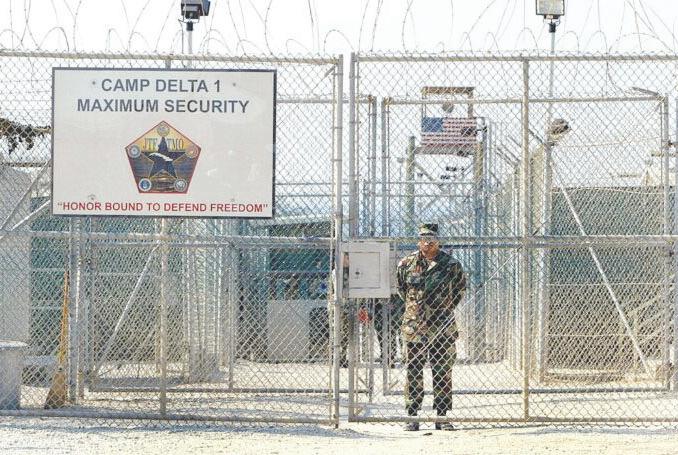
In 2002, his family and he went to Pakistan, the home country of his wife. Begg said he was taken from his home the same
year by the Inter-Services Intelligence (ISI) and Central Intelligence Agency (CIA) agents in front of the eyes of his wife and children.
He was first kept in a prison in Pakistan and later sent to a US-controlled Kandahar prison in Afghanistan. Begg was transferred to the Bagram prison in the landlocked Asian county before he was taken to Guantanamo where he was kept for two years. “I was held for a total of three years without charge or trial, mostly in solitary confinement,” the exprisoner said, adding that he was also tortured during his prison term.
“I witnessed the murder of two prisoners by American soldiers, I was subjected to the sounds of screaming women, which they led me to believe that my wife was being tortured in the next cell.”
He was released without charge in 2005, said Begg, who is the author of the books titled “Enemy Combatant: The Terrifying

The Islamabad High Court (IHC) has rejected a plea from Pakistan Tehreek-e-Insaf (PTI) leader Shahbaz Gill to halt his indictment proceedings in a sedition case. Gill is set to be indicted in a district and sessions court on Friday, after which the trial against him in the case of inciting mutiny within the army will begin. His lawyer requested the court to temporarily stop the special prosecutor from submitting a charge sheet and issue a stay order on Gill’s indictment. The government had appointed Special Prosecutor Raja Rizwan Abbasi instead of holding a trial through a public prosecutor. The hearing was adjourned till next week for further arguments on the legal point of the special prosecutor’s appointment. The Pakistan Tehreek-i-Insaf (PTI) leader and former chief of staff its chairman, Imran Khan, is facing sedition charges for allegedly inciting mutiny within the army. Imran Khan, the leader of the PTI, was also booked in a separate terrorism case for his alleged remarks directed at the female judge. Khan has denied any wrongdoing, saying that the cases were an act of revenge by the government. Critics say the case highlights the need for the government to ensure that individuals are not subject to legal action for simply exercising the right to freedom of expression, and serves as a reminder that the government should not use legal proceedings as a tool of revenge against its political opponents.
ISLAMABAD: Mumtaz Zahra Baloch, spokesperson of the Foreign Office, called on Iran to investigate a recent attack in the Panjgur district of Balochistan that killed four Pakistan Army soldiers and bring the perpetrators to justice. In a weekly news briefing in Islamabad, Baloch said the terrorists had used the neighbouring nation’s soil to target a convoy of security forces patrolling in the remote district along the border, and emphasised that Pakistan will not allow its territory to be used for cross-border attacks in Iran. No group immediately claimed responsibility, and the Iranian embassy in Islamabad tweeted that Tehran “strongly condemns (the) terrorist attack.” “Terrorism is the common pain of Iran and Pakistan. Both sides are victims of the ominous phenomenon,” the embassy added. The spokesperson also noted that communication channels with Iran are active and that Pakistan has shared its concerns regarding the attack with Tehran.
True Story of a Briton in Guantanamo” and “Enemy Combatant: A British Muslim’s Journey to Guantanamo and Back.”
“(After my release,) I came home to see a family that included a child, who was three years old that I had never seen before, who is my son,” he said.
Since 2005, he has been seeking justice for Guantanamo prisoners as a member of CAGE, a London-based advocacy organisation, of which he is one of the directors.
CAGE aims to raise awareness of the plight of the detainees held as part of the “global war on terror” initiated by the US after the 9/11 attacks.
“I seek justice for prisoners (who are) still there. I am involved in helping rehabilitate some of the prisoners who’d gone home after in some cases 20 years without charge or trial,” he said, adding that there are still 35 prisoners who are in custody without indictment at the detention camp.
According to Mobin, around 150-200 PTI workers, led by Zaidi, attacked the DC office while chanting slogans and armed with weapons, canes, and sticks. The attackers allegedly started beating up people and firing shots, spreading fear and injuring at least three people.
The AssociATed Press
Karachi police have filed a case against Ali Haider Zaidi, president of the Sindh chapter of Pakistan Tehreek-e-Insaf (PTI), and 17 other workers of the opposition party on charges of terrorism after rival political activists clashed outside the Keamari deputy commissioner’s office.
The incident occurred on Wednesday evening, following the controversial results of Sunday’s local government elections, which were called into question by the PTI and Jamaat-i-Islami. Workers from these parties took to the streets on Wednesday to protest. The second phase of the local government elections was held in 16 districts of Sindh on Sunday. The results have been met with concerns from major contesting parties, including the ruling Pakistan Peoples Party (PPP), who blame the Election Commission of Pakistan (ECP) for mismanagement and an unusual delay in results in Karachi.
The altercation between PTI and PPP workers began outside the official’s office, where the PTI accused the PPP of attacking its workers, while the deputy commissioner claimed workers of the former forcibly entered his office and harassed staff.
Following the incident, Site-A police registered a complaint against Zaidi, among others. The complaint was filed by Kashif Mobin, the district manager of the People’s Service Centre at the office.
According to the FIR, which was filed at 7:20 pm Wednesday, the charges include Section 7 (punishment for acts of terrorism) of the Anti-terrorism Act, 2017 along with Sections 147 (punishment for rioting), 148 (rioting, armed with a deadly weapon), 149 (every member of unlawful assembly guilty of the offence committed in prosecution of common object), 324 (attempt to commit qatl-i-amd), 506-b (punishment for criminal intimidation), 427 (mischief causing damage to the amount of fifty rupees), 380 (theft in dwelling house, etc), and 186 (obstructing public servant in discharge of public functions) of the Pakistan Penal Code (PPC).
The FIR also states that the workers pelted stones at the office and destroyed furniture, windows, and doors, and stole various valuable items, including laptops.
Station House Officer (SHO) Zulfiqar Ali Bajwa stated that no one has been arrested so far.
JAMAAT WORKERS ALSO BOOKED: Separately, Aziz Bhatti police also filed an FIR against 14 named workers of Jamaat-i-Islami and unidentified others on the complaint of a returning officer, Shahana Rizwan. In an incident late Wednesday night, Rizwan alleged that around 300-400 party workers attacked her car.
The FIR has been registered under Sections 147 (punishment for rioting), 148 (rioting, armed with a deadly weapon), 149 (every member of unlawful assembly guilty of the offence committed in prosecution of common object), 186 (obstructing public servant in discharge of public functions), 341 (punishment for wrongful restraint), 427 (mischief causing damage to the amount of fifty rupees), 504 (Intentional insult with intent to provoke breach of the peace) and 506 (punishment for criminal intimidation) of the PPC. According to Rizwan, she was leaving the camp office at 9:40 pm Wednesday after the recounting of votes had been completed when party workers attacked her with the “common intention” to allegedly kill her, following which the Aziz Bhatti police station SHO and other policemen helped her get into her car.
Jamaat workers allegedly hit Rizwan’s car with ballot boxes and stones, causing significant damage to her car and injuring her driver.
Rizwan also claimed that even though the representatives of all three parties — PPP, PTI and Jamaat — were present inside the camp office during the votes’ recounting, Jamaat workers had been chanting slogans outside the Federal Urdu University’s gate and attempting to enter inside, causing a delay in the completion of the recounting process.
Aman, a 22-year-old transgender man from Lahore, says he was always close to his father. When he was little and it was cold out, his father held his hands to warm them. When he was at university, his father would wait until he got home to eat dinner together, regardless of how late it was. Now they are cut off. Aman’s decision to live as a man has cost him everything. His parents and five siblings no longer speak to him. He dropped out of university and had to leave home. He has attempted suicide three times. Trans men face deep isolation in Pakistan. The country has entrenched beliefs on gender and sexuality, so trans people are often considered outcasts. But trans women have a degree of toleration because of cultural traditions. Trans women in public office, on news programs, in TV shows and films, and even on the catwalk, have raised awareness about a marginalised and misunderstood community. The movie and Oscar contender
“Joyland” caused an uproar last year for its depiction of a relationship between a married man and a trans woman, but it also shone a spotlight on the country’s transgender community. Trans men, however, remain largely invisible, with little mobilisation, support or resources. Trans women have growing activist networks — but, according to Aman and others, they rarely incorporate or deal with trans men and their difficulties.
“It’s the worst,” said Aman. “We are already disowned by our families and blood relatives, then the people we think are our people also exclude us.” Trans women have been able to carve out their space in the culture because of the historic tradition of “khawaja sira,” originally a term for male eunuchs working in the Mughal empire hundreds of years ago. Today, the term is generally associated with people who were born male and identify as female.
Pakistan Muslim League Nawaz (PML-N) has decided to field Ammar Leghari, the grandson of former president Sardar Farooq Khan Leghari, to contest by-election for NA193 Rajanpur scheduled to be held on February 26.
Ammar, who completed LLB degree from the prestigious University of Sussex, UK in year 2019, is the fourth-generation politician of Leghari clan and would be contesting his first election against Pakistan Tehreek-i-Insaf (PTI) Chairman and former prime minister Imran Khan.
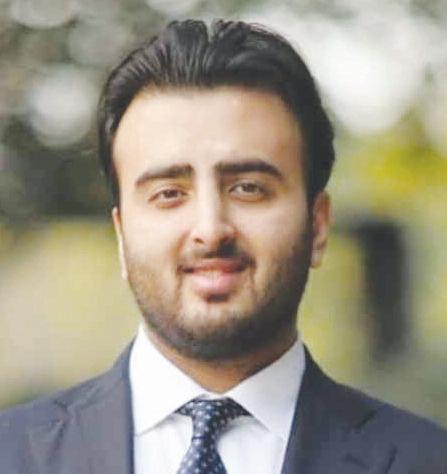
Though young Ammar would be new to the constituency of Rajanpur but he would have an edge over Imran Khan who would be contesting from Rajanpur for the first
time. Ammar won’t be a stranger for the constituents as his father, Awais Leghari, has been elected MPA from Jampur, the constituency which falls under NA-193 Rajanpur. Sardar Farooq Leghari was a bitter rival and critic of Sharif family and had led a campaign “Ghaddar Nawaz” against the then Prime Minister Nawaz Sharif in year 1999. However, its irony that now Farooq Leghari’s grandson, Ammar Leghari, the only son of Awais Leghari, would be contesting on PML-N ticket.
Imran Khan’s nomination papers were submitted by Meena Leghari, Mohsin Leghari, Hasnain Dareshak, Ali Raza Dareshak, Awais Dareshak and Farooq Amanullah Dareshak with the party workers on Thursday.
Though around 22 candidates have filed nominations till date but the actual contest
would be between Imran Khan and Ammar Leghari. For the time first time, Leghari tribe stands united but Meena Leghari, the spouse of deceased MNA, Jaffer Khan Leghari, has disassociated herself from the Leghari family and now has her own group.
Meena’s group also has support from traditional rival Nasrullah Dareshak group while former Punjab Finance Minister Mohsin Leghari, once a loyalist of Sardar Farooq Leghari, also supports her group. Meena’s group would also have massive public support enjoyed by Imran Khan while youngsters and PTI workers would be launching campaign for Imran Khan.
After submitting the nomination papers, Awais Ahmed Leghari on Thursday said that the popularity of PTI had come down and that PTI’s entire leadership has failed. He said that’s why they have only one candidate
to contest every by-election. Awais Leghari said that the the people will reject Imran Khan’s politics in coming by electing.
“We will empower the youth with the support of the people,” said Awais Leghari requesting people to vote for PML-N candidate. He said that people especially youth no longer believe in Imran Khan’s false promises. Despite securing youth vote in successive elections, Imran Khan did not take oath as member of the National Assembly.
This time also, he said Imran Khan won’t even take oath, if wins election. Khan is only wasting national money and time and frustrating a democratic process.
Last year, Imran Khan won the elections himself in seven constituencies and wasted the votes of elders, mothers and sisters by not taking even oath as elected member of the parliament, leave alone representing the constituency or serving the nation. He said Pakistan Democratic Alliance (PDM) candidate will defeat Imran Khan.
tHEElection Commission of Pakistan (ECP) has announced it will formally confirm the victory of Imran Khan, the chairman of Pakistan Tehreek-i-Insaf
(PTI), in by-elections for seven National Assembly seats in October of last year.
Khan had won seven of eight national assembly seats he stood for in the by-election, a vote he has called a referendum on his popularity.
The polls were called “in constituencies where the government
In honour of World Wetland Day on February 2, the River Ravi Urban Development Authority (RUDA) is working to revive the Ravi River and its surrounding wetlands. The river, which serves as the home basin for Lahore, has been facing a range of challenges including flooding, droughts, poor water quality, and loss of habitat and biodiversity. RUDA is utilising a 46 kilometres stretch of the river to develop a sustainable, eco-friendly riverfront that will rehabilitate the dying Ravi River and improve the surrounding environment for both humans and wildlife. To that end, RUDA has proposed a number of downstream constructed wetlands to restore the river’s ecology, provide habitats for aquatic life, improve water quality, and enhance the overall aesthetic of the area.
thought PTI was weakest”, the former prime minister said at the time. “Despite such attempts, our voters defeated combined candidates of the ruling coalition.” Thursday’s decision was made by a five-member panel headed by Chief Election Commissioner Sikander Sultan Raja and was previously withheld due to Khan’s al-
leged failure to submit details of the party’s funding to the electoral body.
The commission had previously issued a notice to the opposition party requesting information on the party’s funding sources, which is referred to as the “prohibited funding case”.
The decision came after a hear-
ing in which the party had requested the opportunity to cross-examine witnesses, including bank managers who had provided the party’s bank statements on the instructions of the State Bank of Pakistan.
The counsel for ECP argued the PTI had been part of the investigation process for four years before the
 LAHORE Staff RepoRt
LAHORE Staff RepoRt

The speaker of the Punjab Assembly, Sibtain Khan, has established a bipartisan parliamentary committee to deliberate on the selection of a caretaker chief minister for Punjab. The move comes after the incumbent chief minister, Parvez Elahi, and the leader of the opposition, Hamza Shehbaz, were unable to reach a consensus on a candidate for the position.
The committee includes members from both the government and the opposition and has been given three days to reach an agreement. If no agreement is reached, the decision will be left to the Election Commission of Pakistan (ECP). The Pakistan Muslim League-Nawaz (PML-N) has proposed Adviser to the Prime Minister on Establishment Ahad Cheema and media mogul Mohsin Naqvi as potential candidates, while the Pakistan Tehreek-i-Insaf (PTI) and Pakistan Muslim LeagueQuaid (PML-Q) have nominated Ahmad Nawaz Sukhera, Naseer Ahmed Khan, and Nasir Mahmood Khosa. The committee was established following a directive from the Punjab governor, Baligh ur-Rehman.
On Wednesday, the party of former prime minister Imran Khan dissolved the assembly in Khyber Pakhtunkhwa, where it held majority seats. Its rival, the ruling Pakistan Muslim League-Nawaz (PML-N) party, criticised the move, saying it meant to deepen the political crisis and force early parliamentary elections.
The dissolution of the two parliaments will lead to snap elections in both Khyber Pakhtunkhwa and Punjab — and may lead to the party being reelected in both provinces — but will unlikely effect any change on the national level. The government of the Pakistan Democratic Movement (PDM) maintains that Khan’s tactics are damaging the country’s economy. Pakistan has struggled with the aftermath of unprecedented floods that devastated the country last summer and which experts say were exacerbated by climate change. Pakistan is also facing a serious financial crisis and unabating militant violence. As opposition leader, Khan has been campaigning for early elections and has claimed — without providing evidence — that his ouster last April in a noconfidence vote in Parliament was illegal. He has also accused his successor, Shahbaz Sharif, the military and the United States of orchestrating his ouster.
 ISLAMABAD Staff RepoRt
ISLAMABAD Staff RepoRt
Managing Director Pakistan Tourism Development Authority (PTDC), Aftab-ur-Rehman on Thursday said the private sector would achieve great opportunities and benefits from Integrated Tourism Zones (ITZs) in Khyber Pakhtunkhwa.
Addressing an Investment Readiness Conference for KP Integrated Tourism Zones (ITZs) at a local hotel here, he said the initiative would boost up tourism and strengthen the country’s economy.
Investment Conference on ‘Integrated Tourism Zones in Khyber Pakhtunkhwa’ (ITZ) was organized by Khyber Pakhtunkhwa Culture & Tourism Authority & KITE to mobilize private sector investments and to promote responsible tourism. The Managing Director said the ITZ project would be greatly helpful in boosting the tourism industry, adding the sustainable development was key to promote tourism and economic growth.He further said the KP government was committed to involve private partners sector to invest in Integrated Tourism Zones (ITZs) in the province.
Young lawyer from Lahore Mansoor Usman Awan has declined to become the Attorney General of Pakistan (AGP). According to the reports, Mansoor Usman Awan cited personal reasons for his decision of not accepting

the post. Sources learnt that despite approval from the president, Mansoor Awan’s appointment notification had not yet been issued. After the resignation of Ashtar Ausaf, the president had given his assent to Mansoor Awan’s summary for AGP post on December 24. The federal government has now started reviewing new names for the AGP slot.

A smoke-free future is a long-held goal of health agencies and all the countries that have been trying to curb the smoking epidemic. However, for a billion smokers from around the world to quit cigarettes completely, while some traditional tobacco control methods can help, access to alternatives have the potential to drive significant switch from cigarettes. Many of these alternatives already exist and only require sensible regulation and informed consumers for them to flourish.
Some of these alternatives include vapes, e-cigarettes, and heated tobacco products (HTPs) that pose less risk to health because they do not involve combustion. Nicotine pouches, patches, and snus are also considered to be low risk since they contain no tobacco and consist mainly of cellulose.
Realizing the potential of scientifi-

cally substantiated smoke-free alternatives in reducing harm caused by smoking, England’s Institute of Economic Affairs (IEA) has published a new report, The Alternative Smoke-Free 2030 Plan, citing that alternative nicotine products are far less harmful than cigarettes, and the surge in vaping has corresponded with a falling smoking rate. The IEA has also proposed to prioritise alternatives to smoking, like e-cigarettes, HTPs and snus, over prohibitionist policies.
The report also stresses that removing barriers to consumers accessing low risk alternatives is vital and smokers should be encouraged to quit by properly regulating other low-risk tobacco alternatives such as snus, heated tobacco and nicotine pouches.
With better education and a regulatory system that fosters innovation, smoking may one day become genuinely obsolete.
scrutiny committee and eight years before the commission and had not once requested the opportunity to cross-examine witnesses.
The ECP reserved judgement on the matter on December 20, and has now issued its verdict clearing the way for the issuance of the notification of victory for the former premier.
The Foreign Office (FO) on Thursday “strongly condemned” the terrorist attack from across the Pakistan-Iran border in Balochistan’s Panjgur district on Wednesday evening in which four security personnel were martyred. During a weekly press briefing today, FO Spokesperson Mumtaz Zahra Baloch said, “Pakistan strongly condemns the terrorist attack from across the Iran border.” According to the Inter-Services Public Relations (ISPR) , militants used Iranian soil to “target a convoy of security forces patrolling along the border” yesterday. Following the attack, Iran had been asked to hunt down the terrorists on their side, the ISPR had said. Baloch asserted today, “Terrorists used the territory of Iran [to conduct the attack]. We hope that Iran would take an action against the responsible factors.” She said: “We strongly commit that our territory will not be used for undertaking cross-border attacks in Iran and we expect the same from Iran.” The spokesperson further said that both countries have “exemplary brotherly relations”. Separately, Baloch announced that the foreign minister would be visiting Uzbekistan’s capital Tashkent on Jan 25. Referring to the recent clarification on the premier’s statement regarding talks with India, she said, “Pakistan condemns India’s atrocities in Kashmir on every level.” The spokesperson added, “Pakistan wants better relations with all neighbouring countries including India [but] India should create an environment that makes it clear that it is not involved in terrorism.” Baloch also said Foreign Affairs Secretary Dr Asad Majeed Khan was currently on an official trip to Belgium. She added that a parliamentary delegation from Belgium was also paying an important visit to Pakistan during which, it would visit the Parliament House, Lahore and the flood-affected areas of Pakistan. According to Inter-Services Public Relations, militants “targeted a convoy of security forces patrolling along the border.” Prime Minister Shehbaz Sharif strongly condemned the incident, saying “nation pays homage to the sacrifices of their martyred soldiers in line of duty”.
President Arif Alvi and Foreign Minister Bilawal Bhutto-Zardari denounced the attack as well.
case and the Toshakhana reference. Unless the PTI wins, it will cry foul.
DISGUISe it as it may by shows of bravado and loud proclamations by the Finance Minister and his team, default is looming that much closer, as the news coming in keeps on getting worse and more gloomy. In a week that started with the bloodbath on the stock market, when the KSe share index lost 1378.54 points on Tuesday, or 3.47 percent, to close at 38,342,71, a 30-month low, as traders exited because of a political situation marked by an intensification of the PDM-PTI confrontation with the dissolution of the Punjab and KP Assemblies. That adverse judgement was not changed by the World Bank country head’s denial of reports that $1.1 billion worth of loans had been delayed, as he said that loans depended on approval by the Board of Directors. The delay was reported as because of Pakistan’s failure to present a circular debt management plan or to raise power tariffs. The International Monetary Fund has already not released the latest tranche of its eSAF programme, and to have the World Bank pull out of releasing loans means that the already cash-strapped country is to be further starved of forex.
An indication of the shape the looming crisis might take might be discerned from the formal complaint lodged by the Oil Companies Advisory Committee to the Finance Ministry that banks were refusing to open and confirm letters of credit for oil imports. The banks are not getting the requisite forex. This sounds eerily like Sri Lanka’s descent to chaos. It began with fuel shortages caused by the country’s inability to import, leading to power shortages, and finally to riots which had the country’s President and his family fleeing into exile just ahead of enraged mobs.
Meanwhile, political leaders engage in electoral politics. What has grown glaringly essential for all political parties to sit together and agree a strategy that will take the country out of the woods. As the government has the responsibility for the economy, it has the responsibility of making all parties take part. The parties can agree to how much play they would have in managing the policy, and they can leave that to the next general election, which is due in November anyway. They all should realize that the country is bigger than they are, and there is no fun in presiding over a bankrupt country.
Yousaf Nizami Editor M. A. Niazi Joint Editor
heN the Assembly is dissolved, you get a sinking feeling in the pit of your stomach. You are faced with another election.” Thus spoke a Punjab MPA in 1990, when reacting to the dissolution of the Punjab Assembly. That member never made it back to the Assembly.
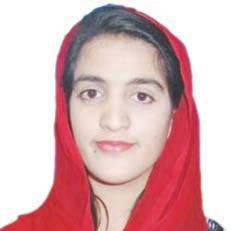
That dissolution had come after President Ghulam Ishaq Khan had used his powers under Article 58 (2-b) of the Constitution to send the government headed by Benazir Bhutto packing. Incidentally, for the first time, the election date announced, October 24, was the same for both national and provincial assemblies. Before that, there had been a three-day gap. This did not suit the parties. In 1988, the Islami Jamhoori Ittehad held a press conference on November 17, the day after the National Assembly election, addressed by PML Secretary-General Iqbal Ahmad Khan, who claimed with 56 seats that the IJI would form the government, ahead of the PPP, which had won 94. When asked some years later why he had done so, even though it was pretty clear that only the PPP could lead the government, he said that the next day was the provincial election, and the IJI workers could not be left depressed.
It seems that Ch Parvez elahi, while becoming the first Punjab Chief Minister since Manzoor Wattoo did so in 1993 (unsuccessfully), to advise a dissolution, also chose to disregard the discomfiture of one party or the other, because the party defeated will have to face two more elections. There will be a local body election, the first since 2015, and there will be a provincial assembly election in April, and then there will be an election of Punjab’s MNAs in October. The local body elections are already overdue, and it might make sense to hold them along with either the national or provincial elections.
An additional complication is that there will be a national census on February 1. That means the results will be coming out just before the poll. A census means fresh delimitations, even if the number of seats is not changed. While a provincial assembly will have the same number of seats, the seats allocated to a district may change. even if it does not, the boundaries of seats may change. Those changes cannot be reflected for the provincial election, but can be for the national and local, provided that the results are duly notified by the Council of Common Interests in time. The legitimacy of the elections, and thus of the members elected, will be challenged by the losers, no matter what party they belong to.
Another problem that the PTI will face will be that of the caretaker government. The PML(Q)-PTI has nominated its panel of three for CM, as has the PML(N). If he joint assembly party does not make a pick, the choice would go to the election Commission of Pakistan, which the PTI has already got problems with, after its decisions in the forbidden funding
The caretakers are supposed to be there because they are acceptable to everyone. The PTI has gone one step further, and expressed distrust in the eCP. Such distrust was expressed last in 1977, when the PNA complained the election was stolen. First, the provincial elections three days after the general elections were boycotted, and then protests grew violent, leading to Martial Law. The 1985 elections were conducted under Martial Law, while the 1988 elections were conducted by a government headed by the acting President. In 1990, there was a caretaker PM (Mustafa Jatoi) who contested the elections, while so did the caretaker Punjab CM (Ghulam haider Wyne), who retained the job. Since then, caretakers do not contest. The cries of official interference have died down, but not been entirely eliminated. This time around, they will probably be redoubled. The PTI is likely to make great play of the fact that while a caretaker government is installed in Punjab, even if it remains neutral, the federal government will be partisan.
That partisan nature is supposed to be kept in check by the eCP, which the PTI does not trust. however, there will be a certain amount of friction between these two components. The PPP has been in government once, between 1993 and 1996, but has not held the chief ministership since 1977. It was the party most badly affected by the rise of the PTI, with its voters going over in 1993. It had put up 239 candidates in the 296 constituencies, and won only five seats. It hopes to make a recovery in the current elections. The PML(N) regards the Punjab as its stamping-ground, as it gave it the government in 1988 and 2013, even though the PPP formed the federal government. It does not want the PPP making a comeback at its expense. At the moment, the PML(N) and the PPP are pulling together, but what happens when their interests collide in Punjab?
ministers are not supposed to campaign, some are more than likely to have siblings or offspring running. how does the eCP handle that situation? Prime Minister Shehbaz Sharif will have his hands full handling the situation, not to forget that his own son and niece are probably going to be contesting? Will he be Roman enough to ignore familial ties? Will he be part of the problem, or part of the solution?
A major imponderable is the effect of PML(N) Quaid Mian Nawaz Sharif’s return. On the face of it, he should return post-haste and lead the campaign in his backyard. however, there is no point if he is to return only to be clapped in irons and dragged away from the airport to jail. his bail was not from arrest, as in the case of Ishaq Dar or Salman Shehbaz, but from imprisonment. his surrender will not be before a court, but before the jail authorities. Only then can he appear before a competent court and apply for bail because his conviction was wrongful.
A factor that would incline Mian Nawaz to stay away would be the disqualification of Imran Khan. He is engaged in an all-or-nothing campaign, in which even the provincial elections are about him. Does the country want him to be PM? Untrammelled? But if the elections are to end with the PTI winning, but somebody else as PM? Who would vote for the PTI then? And if so, why should Nawaz bother going back into the slammer?
One earlier solution was that his residence be declared a sub-jail, so that he did not have to go to Kot Lakhpat, where he was last imprisoned. however, that solution presumed that a PML(N) government had been established in the province. There is no guarantee that a caretaker government would take such a lenient view of the situation.
More importantly, even if his residence is declared a subjail, without being freed, he will not be able to campaign. So while he might enjoy a few creature comforts, his return would be pointless.
Perhaps that is the reason that the signals from the UK are so far inclining towards Mian Nawaz staying put in London. his daughter Maryam may return alone, and try to lead the campaign on her own. That would be a tacit acknowledgement that Mian Nawaz is not as important a campaigner as is generally assumed, and the PML(N) places more reliance on the right choice of candidate.
The PDM campaign will focus on Imran’s corruption more than anything else, and it will probably get ugly. It is possible that Imran’s much-trumpeted videos will finally be generally released, not to mention more audioclipps. It is likely to be a nasty campaign.
Both are mass parties, with mass followings, which are not driven by ideology, except for the principle that the other is The Other, and must be opposed, come what may. More simply put, the vote banks are not mutually transferable. Is there any point to a seat adjustment? Is one even possible? If one is not achieved, what happens when ministers in the same government campaign for rival candidates (assuming ministers are allowed to campaign)? While
A factor that would incline Mian Nawaz to stay away would be the disqualification of Imran Khan. he is engaged in an all-or-nothing campaign, in which even the provincial elections are about him. Does the country want him to be PM? Untrammelled? But if the elections are to end with the PTI winning, but somebody else as PM? Who would vote for the PTI then? And if so, why should Nawaz bother going back into the slammer?
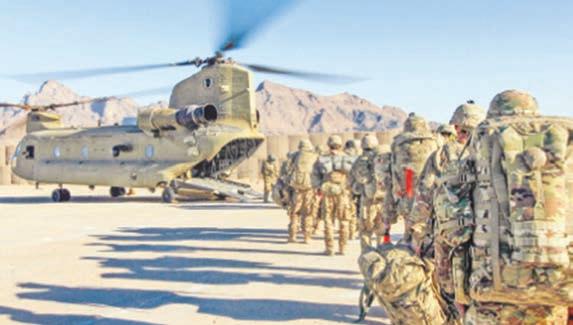
that62 percentof Americans thought the war in Afghanistan wasn’t worth fighting. Similarly, a poll fromPewin late August found that69 percentof Americans didn’t think the USA had achieved its goals in Afghanistan.
In the disintegration of the USSR and the War on Terror, Pakistan was the pawn for the USA. After the breakup of the USSR, Afghanistan was left under Taliban rule but following 9/11, the USA toppled the Taliban government. After that, the war in Afghanistan became a quagmire that continued for two decades. The US military forces departed Afghanistan under the Biden administration, leaving it under Taliban rule. AWashington Post/ABC News pollreleased in September, 2021 found that among those who approved of the withdrawal, just26 percentalso approved of how it was done; 52 percent disapproved.
The dynamics of great power competition in the 21st century is quite complicated. The USA learnt from the war in Afghanistan that military operations would only lead to an economic drain but also that prolonged conflict results in drastic change in public opinion demanding withdrawal of troops.
It also compromised the image of the USA at the international level. As per the Costs of War Project by Watson Institute for International and Public Affairs, since invading Afghanistan in 2001, the USA has spent $2.313 trillion on the war. It also estimates that 243,000 people have died as a direct result.
After 9/11, the USA got robust public support as 93 percentof Americans backed taking military action against whoever was responsible for the 9/11 attacks but this support did not remain the same. An August 2021 poll found
After the withdrawal Biden says the USA shouldlearn from its mistakesand that the withdrawal marked the end of “an era of major military operations to remake other countries.”Under the Biden Administration, the US National Security Strategy 2023 revolves around the idea of competition. It incorporates an integrated deterrence approach to counter competitors. The USA wanted to drag other states in its war, the way it did before in the Cold War era.
The USA claims that it seeks to compete in today’s competitive environment while also preserving a rulebased international order that encourages economic growth, peace, and security. Thousands of Afghans who assisted the USA and its allies, as well as up to 200 Americans, were left stranded in Afghanistan under Taliban rule.Pakistan has still not recovered from the damage that the War on Terror inflicted on it. Moreover, the USA also failed to fulfill the promises of financial aid to overcome the losses of the War on Terror in which Pakistan was in the forefront. Dr hafiz Pasha in his book Growth and Inequality– Agenda for Reforms estimated that Pakistan’s economy sustained a colossal loss of
Competition, the USA focused on
In this era of
to be its pawn in countering the rise of
which it foresees will be a long term threat, though China claims that its rise is peaceful. The Chinese rise is not threatening the peace and stability of South Asia but the US involvement is going to threaten the peace, strategic stability and security of the region for the long term.
India’s assumed sense of supremacy is further heightening by having itself on the US side of strategic alignments. Moreover, India is also not willing to lose Russia as its defense partner. The way India benefited in the Cold War era from both blocs via the non-aligned ap-
proach, it wants to gain maximum benefits from both sides. Pakistan is still fighting against the trap of terrorism it has fallen in by complying with the USA in war on Afghanistan. The US involvement in the South Asian region neither before contributed towards peace, nor in future is it expected to.
The USA and its Asia-Pacific allies via strategic partnership with India are going to intensify the IndoPakistan bilateral tensions thus jeopardizing the strategic stability of the region. The way it is integrating the key allies in countering their competitors it would not contribute towards maintaining peace and security at the international level.
The author is a Research Officer at the Center for International Strategic Studies, AJK.
As every day passes, default looms that much moreThe writer is a member of staff $252 billion owing to the US-led war against terrorism which is nearly eight times more than the financial assistance given by Washington to Islamabad. Great Power India in the South Asian region China SyedA TAhreeM BukhArI Dedicated to the legacy of late Hameed Nizami Arif Nizami (Late) Founding Editor
The 7th Population and household Digital Census, the first in Pakistani history to be entirely digital , will begin on February 1. For it, NADRA provided a comprehensive IT solution. It is taking place in 628 tehsils and approximately 185,000 census blocks. Android-based smart devices with house listing and enumeration apps synched with GPS and GIS will be used. The Android application supports online and offline use with capabilities for easy data synchronization. The pre-census, census, and post-census stages will all be supported by the system for the Pakistan Bureau of Statistics PBS.
The previous procedure entailed visiting each household and completing paperwork. This year, door-to-door salespeople will have tablets or cellphones with digital data entry capabilities.
A population census must be conducted every ten years, according to Pakistan’s constitution. The outcomes of censuses are utilized for future policy planning, resource distribution, sampling strategies, constituency delimitation, and apportionment.
Censuses were conducted in 1951, 1961, and 1972 (postponed one year due to the 1971 war), and in 1981. however, due to partisanship, the ensuing censuses weren’t held until 1998 and 2017.
Rapid digitization is being experienced, particularly since covid-19, when there was social distancing and widespread lockdowns, which led to financial services being digitized and people moving toward e-commerce. Thus PBS recently announced the first digital census.
PBS conducted in-depth training for enumerators in 27 districts. The population growth, urban-rural ratio, gender, age, literacy, languages, religion, disability, migration, ethnicity, and economic activity would all be covered. This endeavour would make it simpler to oversee each step and would be committed to a precise, inclusive, and error-free procedure. The Chief Statistician visited Thar and Karachi to supervise the testing of the census application, and to meet the Sindh Chief Minister to inform him about PBS’s commitment to an inclusive, accurate, and transparent digital process.
The results of the 2017 census, which used a paper-based questionnaire and traditional methodology, were disputed.
Pakistan is taking a significant step by switching to a “digital census” after short preparations. Other countries have greatly evolved since then. Turkey has made headway in integrating the combined census approach, whereas Iran and egypt have successfully conducted digital censuses. Improved urban area representation in censuses has also been exceptionally beneficial in Bangladesh and India. however, all of these nations underwent long periods of preparation and iterative testing.
Iran spent two full years designing and planning the 2016 electronic census, with the help of 20 dedicated workgroups and committees. The 2017 e-census in egypt took two years to organize. Is PBS ready to make the transition to the computer age, or is it only moving out of political expediency?
A census needs a strong planning phase. In
2021, a technical committee for the census was established, and in a record-breaking three months, required to finish its proposals. PBS has already made the suggestions public. The actual census will be managed by a National Census Coordination Center. The census does not yet have an action plan detailing all phases, either as nothing has been prepared or nothing made public. If the full census is to be conducted, after pilot testing, a complete dress rehearsal is needed.
The United Nations Statistical Commission defines a completely digital census as one using satellite data, aerial photography, a geo-referenced address registry, and geographic information systems (GIS) for enumeration maps. These tools are essential for census mapping. As a result, the automation (e-census/digital census) would involve the demarcation of enumeration regions during the pre-enumeration phase using digital maps. These maps would greatly increase everyone’s confidence if widely distributed to the general public and political leadership.
While the PBS plans to transfer data gathered during in-person interviews using a handheld data collection instrument, other steps like using GIS facilities for data collection, as well as editing and cleaning data, require a trained staff of experts and a qualified internet network to enable direct transfer of data from the handheld instruments to the central data centre. It is unclear if the Support Services Wing of PBS’s GIS Wing has the infrastructure to meet UNSC standards and fulfill Pakistan’s first-ever digital census obligations.
To improve accuracy and the ability to visualize enumeration areas using imagery, it is claimed that the National Statistical and Spatial Data System can provide a map-digitizing capability. If these maps are made available to the public, they will alleviate many fears.
Iran and egypt conducted two pilot tests before the e-census was officially launched and used. The first pilot test was carried out in 2014 for the 2016 Iranian census to verify the information already accessible and to compare early findings. The prerequisites were examined, verified, and tested again in 2015.
The expected response rate is the main source of concern. What may be expected of Pakistan, where there is significant illiteracy, particularly among women? After all, the 2017 census, conducted using conventional paper interviews, is currently under question. The survey’s online completion rate in Iran received a reassuringly high response rate. Only 68 percent of respondents in highly educated Canada completed the online component in the third iteration. Other nations’ experience shows the switch to digital and self-enumeration needs to be gradual.
Above all, the public deserves to be fully informed about the efforts and should have faith in the system through open communication census.
The results of the census cannot be repeatedly challenged. The 2017 census shows doing things in two lengthy bursts is unhelpful. The enumeration step must be brief and continuous. Additionally, complete transparency in data collection and processing, with respect to the provinces, should be guaranteed. Incorporating technology into every aspect of the census would help reduce scepticism and foster faith in the results.
By involving the provinces, various ministries, and universities, a high-level advisory group might be constituted. Like the one in egypt, it should be led by a federal minister and comprise members of civil society and govern-
ment experts. The 2022 Census Action Plan should be discussed in advance with lawmakers, major political parties, and the media to avoid the risk of the results being disregarded even before the pricey and time-consuming process begins.
NADRA has handed over the final batch of 126,000 Android tablet devices to PBS. But it’s still unclear whether new boundaries will be drawn in time for the upcoming general elections.
The distribution of these tablets across the 495 census districts proved difficult. however, in nine days, NADRA successfully completed the exercise meant to supplement the specialized training of almost 90,000 enumerators at 932 locations.
The efforts of the NADRA team of 100 experts in quickly assembling and distributing 126,000 tablet computers were considerable. At the manufacturing facility, the team successfully ruggedized and hardened the huge quantity of tablets.
The digital census is a step lifting Pakistan out of its ancient past and opens the door to a modern future. A step towards a digital Pakistan is going from handwritten responses on millions of sheets of paper to real-time authenticated data in applications on safe devices with satellite imagery. The big data from the digital census would serve as the cornerstone of Pakistan’s system for developing evidence-based policies. Using contemporary agile methodology, NADRA created the digital solution for a digital census in just three weeks.
Data center services, call center services, the establishment of technical support centers at each tehsil level, as well as an online web portal for the general public and other allied services, are all included in the comprehensive digital solution. The house listings and enumeration applications developed and deployed on Android are coordinated with a global positioning system (GPS) and geographic information system (GIS). The digital census application for Android supports online and offline use with smooth data synchronization. The pre-census, census stage, and post-census stages of the census will all be supported by the system for PBS.
PBS’s technological partner for the initial digital census project is NADRA. NADRA’s role in this massive national exercise is to offer IT-related services in order to make the census activity a stunning success. As a result, the census process will be more open, and utilizing technology and digitization, it will guarantee that the complete population is documented.
On December 16, the election Commission of Pakistan (eCP) established a link between the conduct of a new delineation and the official notification of the final results of the first digital census exercise, which has not yet begun, by March 31, 2023. After determining the least amount of time needed under constrained time constraints, a choice was made, and it was communicated to the government. In the event that the final notification of the census results is released after December 31, 2022, the eCP has already ruled out new delimitation.
Although NADRA has finished its work before the deadline, it is uncertain if the digital census exercise, which has not yet started, will be finished by the end of March. In the first week of March, the fieldwork would be finished, and data validation would follow. Data at the block level may need to be validated for two to three weeks before being presented to the CCI for approval.
The writer is a freelance columnist
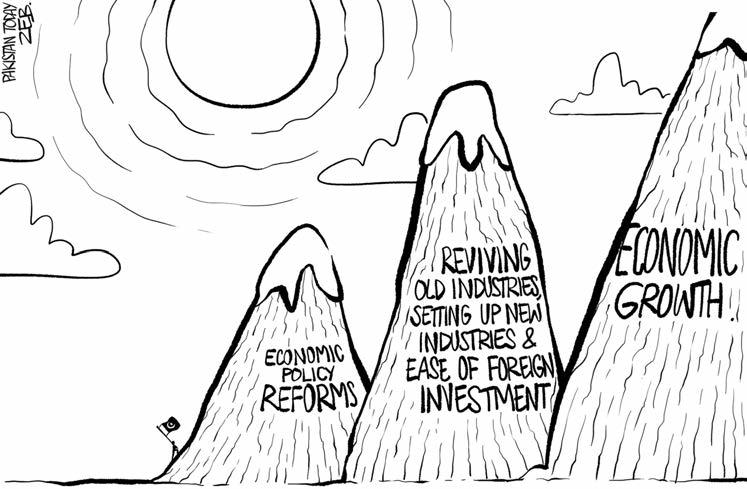

WheNeveR someone in Pakistan talks about the brain drain phenomenon, the usual allusion is to people who have studied abroad at some stage of their lives. What about the brains that go down the drain simply because they remain unused by society?
The truth is that there is no dearth of intelligent people amid us. They just do not have foreign qualifications against their names because they were not part of aristocratic families that could send them to foreign universities. Those with foreign degrees are preferred by local employers as well, and they have the wherewithal to move abroad when that suits them. What about those with local degrees? They are discriminated against in the local job market, and they have little chance of moving abroad.
The rules and laws, made by the elites, are such that they put them at a massive advantage. Moreover, these rules and laws, which are made by mere mortals, are treated as if they are divine laws. The rules that are applied on lesser mortals cannot be applied to the elites. The lesser mortals are incarcerated without due process, while the elites get scot-free.
The education system is such that it rejects critical thinking. There is no public university in Islamabad or Rawalpindi that offers a bachelor’s degree in Philosophy; a subject that encourages people to think critically and to question the existing methods and approaches.
Rote learning is being constantly promoted. As people do not question the prevalent approaches and methods, they reproduce in their research papers what has already been churned out before. New ideas are not valued and that discourages people from taking such a path. They simply regurgitate what is taught to them.
A lot of subjects within the domain of social sciences are not promoted. These are the subjects that have a chance of provoking the lesser mortals to do away with their slave mentality and create their own rules rather than following the laws framed to favour the elites. The result is that Pakistanis have no idea of dialectical methods that can be used to refute faulty arguments and discover new ones.
As social science subjects, like, say, economics, are not being promoted in the country, the government has to call technocrats from abroad to tackle economic problems. These technocrats, coming as they do with elite backgrounds, have no knowledge of the ground reality. even if they are sincere, they just do not know the issues they set out to resolve. It is not surprising at all that no technocrat has been able to alleviate Pakistan’s economic woes. The next thing that gives advantage to the elites is the recruitment system. The tests that are used to recruit people for government jobs are neither reliable nor valid. had this not been the case, Pakistan would not have been in the state it is in now.
The calibre of all public-sector appointments regardless of any divide bears testimony to this fact. Those recruited are either part of the elite class or are people with slave mentality who are complicit in keeping the lesser mortals oppressed. Together, the two entities make sure there is no critical thinking in society because the status quo suits them both.
René Descartes, the great French philosopher and mathematician, famously said, “Cogito, ergo sum”, which translates to, ‘I think, therefore I exist’. Tested on that touchstone, most Pakistanis do not ‘exist’ because they do not ‘think’. Those who think are like a drop in the ocean. They are shunned and silenced easily.
HALEEMA SADIA KALLAR SYEDANWITh the increasing shortage of water in Karachi, the number of water tankers on the roads has also increased. While these tankers are supposed to facilitate people by providing water, they have become a threat to their lives by spilling water on the roads, driving recklessly, and causing accidents. Those behind the wheel drive carelessly, and the dripping water from the faulty hoses of the tankers make the road slippery. Such roads become hotspots of accidents, particularly for motorcyclists.
I recently met an accident due to the same reason. My motorcycle was knocked down on the main Korangi Road. I only received minor injuries, but the trauma has remained with me since because anything could have happened. Many motorcyclists fall on slippery roads and get badly injured. Some of these accidents are even fatal.
While these tankers roam the streets of Karachi like wild beasts and cause casualties, the relevant authorities prefer to play blind. The tanker owners as well as drivers must be held accountable for such accidents. Moreover, the authori-ties should specify alternative routes for these monsters, otherwise they would continue to pose risk to commuters’ lives.
IRFAN RASHEED BALOCH KARACHIAS a nation, we are more than seven decades old. If someone asks a common citizen about what is wrong with this country, he or she is likely to list down several issues. however, the same person will find it very difficult to name a few things that are positive about this country, or the government, or the people. Why does complaining and criticising come so naturally to us? Why do we seldom praise people, institutions, policies and governments? There are several reasons for such a mindset that is exhibited more by the ‘literate, white-collar middle class’ of the nation.
The mindset takes its roots at home. Most of the discussions in ‘educated’ households revolve around criticism of the government, the organisation they work for, or the system itself. This negative approach misleads a young mind into picking up negative tendencies. Further, most of the workplaces in the country have ‘boss’ issues. People with any degree of authority prefer to be addressed as ‘Sir’ and ‘Madam’. This surely feeds their ego. The bosses are often seen enjoying privileges at the cost of their subordinates, which leaves the workforce unmotivated, dejected and irritated.
Our news channels, family dramas and social media postings add to the problem, making us even more critical and unappreciative.
The thing to do is to start appreciating instead of criticising others. The magic of appreciation will not directly solve most of our problems, but will give us the energy, the strength and the motivation to face them with courage and find a solution ourselves.
SYED ZOHAIB RIZVI KARACHIWe should ‘think’ so that we may ‘exist’
hIGh-InCOMe countries have purchased more than half of the Covid-19 vaccine supply to date, and low-income countries, just 9 percent, according to Duke University’s Global health Innovation Center. This is why a country like the US is close to vaccinating half its population with one dose while the rate in a place like Guinea is less than 1 percent and not budging.
If these glaring inequities in vaccine access continue, it will take at least two years for the world’s poorest countries, which couldn’t afford to compete for early doses of vaccines, to immunize the majority of their populations. And we’re on track for a long period where people in rich countries enjoy the benefits and safety of being fully immunized, while people in poorer countries continue to get sick and die from the coronavirus.
“That’s not just unconscionable, but it also is very much against the interests of high-income countries,” Georgetown global health law professor Lawrence Gostin told Vox in January. With the virus continuing to circulate, and variants picking up pace around the globe, outbreaks in the poorest countries will pose a threat to the world.
It’s not an accident that many of the world’s first-approved Covid-19 vaccines — from companies like Pfizer, AstraZeneca, and Moderna — were developed and rolled out in high-income countries. As the pandemic took hold last year, wealthier nations — including the US, UK, and eU block — began making deals with the pharmaceutical companies that were developing Covid-19 vaccines, which also happened to be head-
quartered within their borders.
These bilateral deals involved governments essentially giving the companies billions of dollars to speed up research and development in exchange for priority access to vaccines, should they prove to be effective. But the deals also pushed poorer countries, which didn’t have the resources to pre-purchase millions of doses of vaccines that might not even get approved for market, further down the access line.
In May 2020, for example, the US government gave AstraZeneca $1.2 billion for 300 million doses — a Covid-19 vaccine that still hasn’t even been approved in the US. That was just one deal of many. By January 2021, rich countries had already prepurchased 96 percent of the doses BionTech/Pfizer was scheduled to make for the year, while 100 percent of Moderna’s supply was spoken for. And the eU now appears ready to finalize a 1.8 billion-dose deal with Pfizer.
Together, the early agreements covered the populations of rich countries many times over in the event that some of the vaccines failed. By March, Canada had secured enough vaccine for five times its population, and the US bought at least double the amount of vaccine it’d need. In terms of doses administered, while high-income countries are home to 16 percent of the world’s population, they’ve doled out 46 percent of the one billion Covid-19 vaccine doses already administered. The poorest countries, home to 10 percent of the world’s population, have given out just 0.4 percent
of doses, according to Our World In Data, and lower-middle income countries, with 40 percent of the world population, 19 percent of doses.
“[Since] vaccine makers are headquartered in high-income countries, and [vaccines are] developed there for the most part, many of the ones that made it across the finish line first were from high-income countries, and because of that, they had a home-court advantage,” said Andrea Taylor, a researcher with Duke Global health Institute who has been analyzing the deals.
Through this home-court advantage, wealthier countries not only ensured first dibs — they’ve also used export restrictions to control vaccine supplies and doses leaving their borders.
On April 16, for example, the head of the Serum Institute of India — the world’s biggest producer — took to Twitter to ask President Joe Biden to lift embargoes on raw material exports that were hampering vaccine production there: The result of the pressure: The US lifted the restrictions to help speed production overseas, and President Biden vowed to share 60 million doses of the AstraZeneca vaccine. India — currently battling a devastating Covid-19 outbreak — is also now using export restrictions to hang on to Covid-19 doses produced there.
American and British vaccine export bans, meanwhile, have been a source of diplomatic tensions with the eU, which put in place its own export restrictions in March to alleviate supply shortages.
The vaccine hoarding has happened in
parallel with an unprecedented multilateral effort to support the development and equitable distribution of 2 billion doses of Covid19 vaccines to the world’s poorest countries before the end of 2021, called Covax.
The initiative has two parts: a purchasing pool for higher-income countries, and a fundraising effort for poorer countries. By promising to buy a certain number of vaccine doses from manufacturers, countries that join get access to any vaccines that are approved in Covax’s portfolio, while also creating a global market for the shots and driving prices down.

More than 190 countries signed on — including rich ones. “Covax was trying to create a reality — they appealed to the better angels of all countries,” said Saad Omer, director of the Yale Institute for Global health.
But the bilateral deals took a lot of power away from Covax. Rich countries “want to have it both ways,” Gostin said. “They join Covax so they could proclaim to be good global citizens, and at the same time rob Covax of its lifeblood, which is vaccine doses.”
Rich countries also didn’t fund Covax’s purchasing pool to the levels the group called for. And for the majority of its supply, Covax also relies on India, which, again, is currently restricting exports. The result: Covax, according to Duke, has only delivered about one in five of the doses that were expected by the end of May. Some have suggested Covid-19 vaccine-makers should waive their patents, making it possible for more manufacturers to come online and produce vaccines. But that’s only part of the solution to vaccine inequality, Taylor said. “We know there is manufacturing capacity that isn’t being used.”
That’s because of another bottleneck that’s emerged in recent months. Vaccine makers have been reporting that they’re
struggling to access basic supplies needed to safely manufacture vaccines. For example, there have been reports that the filters used in the manufacturing process, and large plastic bags (for lining bioreactors where pharmaceutical ingredients are mixed) have run short. It’s unclear how big this problem is — we don’t have systematic data on global shortages — but many suppliers and even countries have cited these shortages as a reason for delays.
Companies can’t just turn to anybody to meet their needs — they can only use qualified suppliers that meet the global standards set by regulators like the US Food and Drug Administration. These suppliers sell products that have been vetted through studies proving their plastic bags, for example, don’t leak toxins into vaccines or cause allergic reactions.
“Those tests take time — it’s months of lab studies and animal studies,” said Matthew Johnson, associate director of the Duke human Vaccine Institute. So even companies that could pivot to producing the vaccine products in short supply would need to take time to study them and ensure safety.

There’s another problem IP waivers can’t solve: Technology transfer, from one vaccine maker to another, involves sharing trade secrets, know-how, and even trained personnel. The companies currently making Covid-19 vaccines “might not have 20 to 40 people to send to these other locations” to help new producers get up to speed, Johnson added. So while waiving patents would help — it’s only part of the solution. Still, it’s not a given that it’ll take years to vaccinate the world from Covid-19. There are ways to speed up the process.
Rich countries could donate more doses to poorer countries — a move global health groups have been calling for months and one that’s starting to happen in response to the crisis in India.
The happiest I have been since the pandemic began was at 8am on the 20th of January this year. entering the Covid-19 ward of one of the three hospitals I work at in Mumbai, I went through the all too grimly familiar routine of donning PPe to start my rounds, only to be told by the nurse in charge that we had no new Covid admissions that day. After the relentless battering of the previous 245 days it was a moment of rare bliss. We shared the smile of co-conspirators, jubilant that fresh daily cases were under 15,000 across India, in keeping with the continuing decline we were ticking off ourselves at our hospital.
But our joy was short lived: April was truly the cruellest month. Admissions began to inch relentlessly higher, until on April 26 India set a global record of 352,991 cases a day. Ward rounds are now scenes from Dante’s “Inferno”. Row upon row of patients waging a desperate struggle to breathe, their cries for help often falling on deaf ears as overworked medical staff struggle just to keep going.
essential drugs are not in stock and, most frightening of all, oxygen, that very essence of life, is in short supply. It is rationed at all hospitals and so scarce in some that patients are dying when it runs out. Oxygen cylinders are sold at black market rates (50,000 rupees [$670] for a cylinder costing 6,000 rupees) as desperate patients, realising it is futile to even contemplate getting a hospital bed, prepare for the worst and stock up at home.
how did it all go so horribly wrong in three short months? Just in January the health minister crowed that “India has flattened the Covid graph” — words exposed as mere self-assured hubris as the Sars-Cov-2 virus grips this country of 1.4bn in a stranglehold. Instead of using the space January provided to ramp up vaccine supply, ensure oxygen plants increased production and reinforce
the importance of social distancing and masking, we allowed massive election rallies to continue in five states and the Kumbh Mela saw 3.5m pilgrims pack the banks of the Ganges. Religious sentiments, political machinations and nepotism often trump public health principles and common sense in India. The virus was forgotten for we had already declared ourselves the victors. And then the second wave struck, as any thinking person knew it would, and struck with the ferocity of a tidal wave, making the events of 2020 seem like a ripple in a bathtub. There seems little doubt that this wave is caused by a variant, probably the now dreaded Indian B.1.617 with two mutations — the e484Q and L452R. The spectre of global spread of this variant has led countries to race to close their borders to India. As a physician I can vouch that this strain seems far more infectious, is probably more lethal, and seems to affect the young more frequently than the initial wave. Younger patients between the ages of 26 and 44 now account for about 40 per cent of all cases and almost 10 per cent of deaths.
The vaccine saga has been a scandal all of its own. Instead of wooing every credible manufacturer to stockpile the 1.7bn doses India would need, we basked in our “vaccine superpower” status. The government got its basic maths hopelessly wrong: by March, India was supplying vaccines to 74 nations and exporting far more doses than it had used to inoculate its own citizens. Initial vaccine hesitancy has now given way to vaccine desperation with densely packed crowds clamouring to get a precious dose only to find that most centres in Mumbai have no stock left. With only around 5 per cent of India’s vast population vaccinated, herd immunity (70 per cent vaccinated) is more than 700 days away.
And so, sadly, India has emerged as the epicentre of the global pandemic, a country brought to its knees by a tiny virus barely 100 nanometres in diameter. And we are paying the price of our complacency, mute spectators to this danse macabre. What the virus has also exposed is that the roots of our problem are systemic and lie even deeper — in the chronic under-investment and neglect of public health in this country. India has one of the lowest public healthcare budgets globally, with the public healthcare system receiving only 1.26 per cent of the total GDP. This pandemic has cruelly exposed our weakest links — badly equipped and understaffed public hospitals and chronic shortages of beds. That coupled with leadership that lacked vision and foresight may just change the map of India forever.
The writer is a consultant physician and researcher in Mumbai.


The recent revelations surrounding John Kerry’s covert dialogues with the Iranians during the Trump administration, if true, are troubling. The Obama administration joined the disastrous Joint Comprehensive Plan of Action (JCPOA), of which Kerry was an architect, against the wishes of the American people and without the ratification of the Senate. The Trump administration rightly left that flawed deal, ceased sending the money to Iran, which had directly helped fuel its murder and mayhem throughout the region, and introduced crippling sanctions that wiped out 96% of Iran’s foreign reserves in just two years.
Our Maximum Pressure Campaign worked – less money fueling Iran’s proxies, less violence and terror, and more problems for the Iranian regime without war.
Iran must never be allowed to have a nuclear weapon because it is a danger to Israel, the Middle east, the United States and the rest of the world. The flawed JCPOA put them on that path and our Maximum Pressure Campaign took them off it.
Kerry could have celebrated the fact that the bank accounts of Iran were being drained completely, and that historic peace accords were being signed between Israel and her neighbors. Instead, Kerry covertly worked to undermine the Trump administration’s efforts by meeting with top Iranian leaders during our tenure, encouraging them to “wait” until the next election, when presumably the same Obama administration officials they struck a deal with in 2016 would be back in power, and now we learn perhaps worse, providing valuable intelligence to the Iranians concerning our ally, Israel.
It is quite possible that while I was briefing President Trump about Iranian operations in Syria, Kerry was briefing Foreign Minister Javad Zarif and other top Iranian
officials about Israeli operations there.
The same people who presided over those failed policies are back in charge now, and they seem wholly committed to repeating their past mistakes.
John Kerry owes the American people an explanation of what exactly he discussed with the Iranians. The legacy of the Obama administration’s Middle east policies is failure. The same people who presided over those failed policies (Kerry, Wendy Sherman, Robert Malley and Jake Sullivan) are back in charge now, and they seem wholly committed to repeating their past mistakes.
Their goal is not to ensure of the safety of the American people, but to continue down the path of Iranian appeasement either because they simply want to reverse every tenet of President Trump’s foreign policy or cannot admit that the JCPOA is a fatally flawed agreement.
John Kerry also used these backdoor channels to undermine our closest ally in the region, Israel (which was perhaps the most consistent policy objective of the Obama administration) by discussing Israeli military operations in Syria with those same Iranian officials. Kerry owes the American people an explanation here as well, to explain why he would discuss the military operations of an American ally with one of our stated adversaries.
These activities of John Kerry are characteristic of the Obama and Biden administrations – their contempt for the views of ordinary Americans, and their disregard for the constitutional limits on their authority all combine to work against the wishes of the American people and undermine our national security, as well as the security of our allies.
Kerry said there would “never, ever” be peace between Israel and the broader Middle east until a comprehensive Israel-Palestinian deal was reached. The Trump administration proved that wrong with the Abraham Accords.
Kerry and other Obama-era officials all warned that the Trump administration’s superb strike on Qasem Soleimani would lead to war with Iran. They called us reckless and stupid. But war did not come – instead, we wiped from existence one of the most dangerous terrorists in the Middle east, saving the lives of Americans and our allies, and continued to squeeze Iran to its breaking point without war.
Perhaps if John Kerry had not been consulting with the Iranians, the Trump administration could have reached a comprehensive peace agreement with the Iranian people as well. Instead, it seems that Biden administration will be pursuing a deal on Iran’s terms. The losers will be the American people and our allies.
R. Pompeo served as the United States secretary of state from 2018 to 2021.

THIS INEQUALITY IS BAKED INTO EVERY STEP OF THE VACCINE MANUFACTURING PROCESSFinancial
Karachi staff report
aMEETINGof Trans Karachi Board of Directors was held under the chair of Sindh Transport & Mass Transit Minister Sharjeel Inam Memon at his office on Thursday.
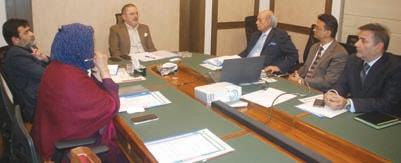

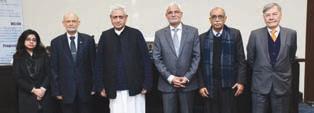
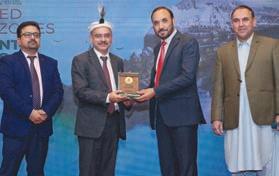

Secretary Transport Abdul Haleem Sheikh, Justice (Rtd) Shaiq Usmani, Rukhsana Rahooja, Shumail Sikandar, Iqbal Lalani, Administrator Karachi Dr. Saifur Rehman attended the meeting .
Vice Chancellor NED University Professor Sarosh Hashmat Lodhi also participated in the meeting through video link.
The board meeting reviewed the progress
National security cannot be guaranteed unless there is food security in Pakistan. Urgent attention needs to be given towards reforming and modernising the agriculture sector as well as controlling population growth. This was the key message of the eminent speakers at the seminar on ‘Food Security for Pakistan’ organised by the Centre for Aerospace & Security Studies (CASS) in Islamabad. Syed Fakhar Imam, Former Federal Minister, Ministry of National Food Security and Research, Government of Pakistan was the Keynote Speaker, while other eminent speakers included Dr Abid Qaiyum Suleri, Executive Director, Sustainable Development Policy Institute, Islamabad; Mr Ashfaq Mahmood, Former Federal Secretary for Water and Power, Government of Pakistan; and Ambassador Shafqat Kakakhel, Chairman Board of Governors, Sustainable Development Policy Institute, Islamabad. pr
KARACHI: The President and CEO of BankIslami, Pakistan’s leading Islamic financial institution, Syed Amir Ali spoke as a panelist at the 4th Financial Crime Summit with the theme “Post-FATF Financial Crime Action Plan – Continuing the National Anti-Financial Crime Agenda.” Talking about the outcome of the summit, Syed Amir Ali, President & CEO, BankIslami, shared, “It’s true that the advancement of technology has done wonders for the financial sector, but it has simultaneously increased cyber-crimes (financial) as well and all of us need to join forces to fight against these crimes.
has always remained committed to ensuring that its customers are safe following the highest cyber-security protocols to protect sensitive data and will always be at the forefront in doing so in the future as well.” pr
pr
of BRT Red Line Project in detail.
On
project
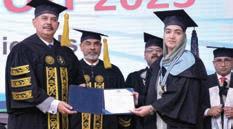
As many as 348 undergraduate and postgraduate degrees were conferred at the 29th Convocation of NUST Military College of Signals (MCS). Lt Gen Muhammad Chiragh Haider, HI (M), Inspector General Training & Evaluation (IGT&E), graced the occasion as chief guest. In his convocation address, he congratulated graduating students on their outstanding achievements, and acknowledged the meritorious services of faculty and parents in enabling the graduates to achieve their long-cherished goals.
He also lauded NUST for maintaining upward trajectory amongst the world’s most prestigious Higher Education Institutions (HEIs), which speaks volumes of its academic and research excellence. He urged young graduates to continue working hard and fulfill their obligations towards the nation and the humanity.
Addressing the audience, Rector NUST Lt
Gen (Retd) Engr Javed Mahmood Bukhari extended his heartiest felicitations to graduates, particularly distinction holders, for having successfully passed through one of the most rigorous and comprehensive knowledge ecosystems. Congratulating the parents, he said that their efforts and sacrifices could never be justifiably reciprocated by their children no matter what. The Rector also paid glowing tribute to the faculty for their dedication and playing immeasurable role in the all-round grooming of the graduates.

Karachi pr
Mubadala Energy, the Abu Dhabi-based international energy company, has announced the signing of a Memorandum of Understanding (MoU) with OMV Downstream GmbH (OMV) and Pak-Arab Refinery Limited (PARCO) to explore opportunities in sustainable fuels and feedstock production in Pakistan.
Under this agreement the companies will explore the possibility of pursuing projects in circular economy initiatives, including plastics production and recycling, sustainable fuels and feedstock as well as the development of synthetic oil and chemical products. The collaboration builds on a well-established partnership between Mubadala Energy, OMV and PARCO and seeks to utilize cutting edge technologies while leveraging existing infrastructure and market access.
In line with Mubadala Energy’s strategy to pursue opportunities in new energy sectors and low-carbon solutions, the agreement also supports its recently launched sustainability strategy that pinpoints three key priorities: Creating a positive environmental impact, supporting responsible operations, and being a partner of choice.
Through the MoU the partners also hope to further support efforts to ensure energy security within key customer centers.
Mansoor Mohamed Al Hamed, Mubadala Energy CEO, commented: “We have set out a

clear strategy to pursue new energy sectors and low-carbon solutions in support of the energy transition. This agreement brings together existing partners to combine leading technology, energy transition expertise and market infrastructure to realize the potential of circular economy solutions, at scale. With the UAE’s commitment to net zero emissions, I am excited to see this collaboration contribute to these goals.” For OMV, the project supports the company’s net zero emissions targets and is in line with a strategy to become a leading, innovative producer of sustainable fuels and feedstock. For PARCO, the agreement has the potential to position the company as an important player in the circular economy and deepen integration into the chemicals & materials industry, while proactively developing sustainable, low-carbon solutions that help diversify its business.
Mr. Shahid Mahmood Khan, Managing Director, PARCO, commented: “As the energy lifeline of the nation, we resolve to secure a sustainable energy future for the Country.
KMC had handed over the piece of land to Trans Karachi for the construction of the bus depot at Aladdin Park and said construction of the bus depot and biogas plant should be started as soon as possible. He said that Pakistan's first electric bus service has been started in Karachi, while BRT Red Line is Pakistan's first biogas project . Provincial Minister Sharjeel Inam Memon said that Chairman Bilawal Bhutto Zardari had directed to bring public transport system on modern lines in the province. He said that the transport department is working day and night on transport projects across Sindh to implement the vision of Chairman Bilawal Bhutto Zardari.
KARACHI: It is the religious and constitutional duty of all to lay out a roadmap for the conversion of the financial system of Pakistan to riba-free according to the injunctions of Islam and implement it accordingly. All sectors of government borrowing, external debts, the banking sector, the non-banking sector, capital market, as well as legal and regulatory framework need to bring changes at strategic as well as operational level. This was underscored during a session titled “Implementing the FSC Judgement on Riba: Addressing the How”, jointly organized by the Institute of Policy Studies (IPS), IBA-CIEF (Institute of Business Administration’s Centre for Excellence in Islamic Finance (IBA CEIF), and Centre of Islamic Economics (A division of Jamia Darul Uloom, Karachi) at the IBA City Campus. The session was addressed by Ahmed Ali Siddiqui, director, IBACEIF, Omar Mustafa Ansari, secretary general, Accounting and Auditing Organization for Islamic Financial Institutions (AAOIFI), Mufti Irshad Ahmad Aijaz, chairman, Shariah Advisory Committee, State Bank of Pakistan and Securities & Exchange Commission of Pakistan, Farrukh Raza, CEO, Islamic Finance Advisory & Assurance Services (IFAAS) Group, Dr. Imran Usmani, vice chairman Shariah Supervisory Board, Meezan Bank, and Khalid Rahman, chairman, IPS. The experts highlighted that all of these financial and related sectors already have the capacity to convert existing non-Islamic procedures and means to Islamic standards by reinforcing the appropriate ways and means to implement the Federal Shariat Court judgment. pr
ISLAMABAD: 5th Live BARIATRIC surgery Symposium with Hands on basic of advanced laproscopic surgery workshop was held on 18th and 19th January 2023 at Capital Hospital CDA Islamabad under the supervision of Professor Dr Naeem Taj , Dean of Capital hospital and renowned Laparoscopic of Bariatric Surgeon and patronship of Dr fazal e Maula Executive Director Capital hospital. Young surgeon of Resident from all over Pakistan attended the Workshop. Senior Surgeon from not only twin cities but from all over Pakistan attended the conference on 18th January. Basis of advanced laproscopic training was given to the young Surgeon and Residents. In addition live laproscopic Hiatal hernia Repair was done by Dr Naeem Taj and live laproscopic hernia surgery was done by Dr Tanseer Asghar laproscopic Bariatric Surgeon at CDA. Lep OAGB was also done by Dr Tanseer. On 19th January live Demonstration of laproscopic Sleeve Gastrectomy was done by Dr Naeem Taj. laproscopic Demonstration of Mini Gastric Bypass was done by Dr Tanseer Asghar. Dr sartaj Ali Khan supervise the hands on training workshop to young surgeons and give presentation on bariatric surgeries performed in capital hospital.Chief Guests were DG Hrd Cda Mr Qaiser khatak, Executive Director Dr Fazal e Maula , professor Dr Tanveer Khaliq VC SZABMU and Prof Dr Faisal Bhopal great the Ocasion as Guest of Honour. Dr Naeem Taj emphasized the need of training in minimal invasive surgery for the Qualified Surgeon. He also announced the following programme in minimal invasive surgery at CDA Hospital. pr
pr
An Investment Readiness Conference for Khyber PakhtunKhwa’s Integrated Tourism Zones (ITZs) was held today at a local hotel here in Islamabad by Khyber Pakhtunkhwa Culture & Tourism Authority & KITE Project to mobilize private sector investments and to promote responsible tourism. The event was attended by a large number of potential investors. GD KP Tourism Authority, Presidents of ICCI, RCCI, MD of PTDC, Director of KPBOIT and other trade associations were also present.
The ITZs is a maiden concept in Pakistan which aims to open new tourist destinations in Khyber Pakhtunkhwa
to promote sustainable and responsible tourism by suggesting diversity and quality in the tourism offering of these destinations and provide guidance for tourist planning and destination management activities.
Aftab ur Rehman Rana, Managing Director of PTDC congratulated the team of KP Tourism Authority, KITE Project, World Bank and KP BOI for launching this flagship project for investment. He said he is happy to see the realization of Tourism Integrated Tourism based on the principles of sustainable tourism development which was visualized eight years ago while launching the tourism policy of PK Province. He said, now out focus should be on creating an enabling business environment for the private
sector and removing all the bottlenecks to encourage private sector investment in tourism and hospitality sectors.
Integrated Tourism Zones (ITZ) feasibilities and master plans were prepared by the KP’s Department of Tourism with the support of World Bank under Khyber Pakhtunkhwa Integrated Tourism Development (KITE) project. A team of national and international experts worked over a period of one year on this project to prepare the detailed concepts of these world class resorts. The provincial authorities and other speakers shared the opportunities for private sector investments with the participants. As part of this exercise, customized plans for each destination have been prepared and will be used to invite the investments from private sector.
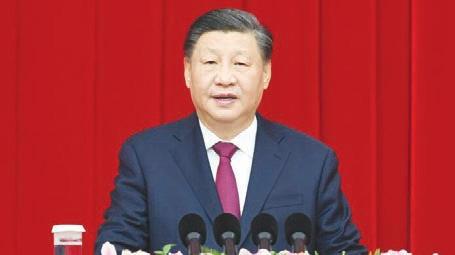 ISLAMABAD miAn AbrAr
ISLAMABAD miAn AbrAr
XIJinping was elected deputy to the 14th National People’s Congress (NPC) by a unanimous vote at the first session of the 14th regional people’s congress of Jiangsu Province on Thursday.
Xi was nominated by the Central Committee of the Communist Party of China (CPC) as a candidate for deputy to the 14th NPC, which was put to a vote at the regional congress.
The announcement of Xi’s unanimous election won thunderous applause at the session.
Xi was among the 144 deputies elected to the new NPC at the regional congress.
The unanimous vote for Xi by more than 800 deputies to the regional people’s congress represents the heartfelt aspiration of more than 85 million residents in Jiangsu Province, according to the deputies.
The NPC is China’s top legislature. The 14th NPC will open its first annual session
in Beijing on March 5.
During an inspection tour in Jiangsu Province in December 2014, Xi proposed the term “full and rigorous Party self-governance” for the first time, bringing it to an unprecedented level of importance.
Some deputies said Xi’s election in the province on Thursday was the vivid practice of unswervingly advancing the full and rigorous Party self-governance, strengthening and regulating intraparty political activities in the new situation and developing wholeprocess people’s democracy.
“The relations between cadres and the masses have been closer, and the authority of Party organizations has been placed in a higher position,” said Zhou Zhongyang, Party secretary of a village in the province.
“The Party has led us to achieve poverty elimination and rural vitalization. Our days are getting more and more prosperous.”
Jiangsu Province, in the lower reaches of the Yangtze River, is one important part of the Yangtze River Economic Belt initiative, which China started in early 2016 with the aim to turn the region into a golden eco-
nomic belt featuring a more beautiful ecology, smoother transport, a more coordinated economy, a better-integrated market, and more scientific mechanisms.
Xi’s election in the province also showed the CPC Central Committee’s commitment to advancing the Yangtze River Economic Belt and the integration of the Yangtze River Delta, continuing reform and opening up without stopping, and prioritizing the creation of a new development pattern and pursing high-quality development, according to other deputies.
“I am excited to hear that the General Secretary was elected unanimously,” said Liu Lei, a technician with a company in Xuzhou, a city of Jiangsu Province.
During a two-day inspection tour in the city in December 2017, Xi called for more innovation in the equipment manufacturing sector to accelerate China’s drive toward becoming a manufacturing powerhouse and bolster the real economy.
Recalling Xi’s visit following the 19th National Congress of the CPC, Liu said they will work hard on innovation in order to
Political commentator Ben Thomas said Ardern’s announcement was a huge surprise as polls still ranked her as the country’s preferred prime minister even though support for her party had fallen from the stratospheric heights seen during the 2020 election.
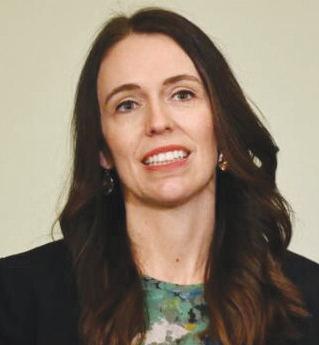
February and not seek re-election.
Ardern, holding back tears, said that it had been a tough five and a half years as prime minister and that she was only human and needed to step aside.
“This summer, I had hoped to find a way to prepare for not just another year, but another term – because that is what this year requires. I have not been able to do that,” Ardern, 42, told a news conference.
“I know there will be much discussion in the aftermath of this decision as to what the so called ‘real’ reason was… The only interesting angle you will find is that after going on six years of some big challenges, that I am human,” she continued.
“Politicians are human. We give all that we can, for as long as we can, and then it’s time. And for me, it’s time.”
A ruling New Zealand Labour Party vote for a new leader will take place on
Sunday; the party leader will be prime minister until the next general election.
Ardern’s term as leader will conclude no later than Feb. 7 and a general election will be held on Oct. 14.
Ardern said she believed Labour would win the upcoming election.
New Zealand Deputy Prime Minister Grant Robertson, who also serves as finance minister, said in a statement he would not seek to stand as the next Labour leader.
A documentary from the BBC claimed a team sent by the British government to investigate the 2002 riots in the western state of Gujarat in India found Narendra Modi, who was the chief minister at the time, “directly responsible for a climate of impunity” that led to the pogrom. The two-part exposé, titled “India: The Modi Question”, was, however, pulled down from YouTube on Wednesday, a day after its release, after the national broadcaster of the United Kingdom came under fire from India. The riots were a series of violent incidents that took place in Gujarat following the burning of a train carrying Hindu pilgrims, which killed 58 people. The violence resulted in the deaths of approximately 1000 people, mostly Muslims, making it one of India’s worst outbreaks of religious violence. Modi has always denied any wrongdoing. A closure report by a special investigation team (SIT) appointed by India’s Supreme Court in 2012 claimed there was no evidence to suggest Modi or his government had any involvement in the riots. The court also dismissed a petition challenging the report in June of last year. The documentary said the visiting British team had sent a report to the UK government, which has never been published. It also featured a former senior diplomat and member of a British government investigation team claiming the riots were planned by the Vishwa Hindu Parishad, an affiliate of the militant Rashtriya Swayamsevak Sangh (RSS) group. The RSS is the fountainhead of the ruling Bharatiya Janata Party (BJP) and believes in a Hindu-first ideology.
Thomas said that there was not a clear successor.
Ardern said she was not stepping down because the job was hard, but because she believed others could do a better job.
She made a point of telling her daughter Neve that she was looking forward to being there when she started school this year and told her longtime partner Clarke Gayford that it was time they married. emPatHetic LeaDer: Ardern burst onto the global scene in 2017 when she became the world’s youngest female head of government at age 37.
Riding a wave of “Jacinda-mania,” she campaigned passionately for women’s rights, and an end to child poverty and economic inequality in the country.
Eight months after becoming premier she became the second elected leader to give birth while in office, after Pakistan’s Benazir Bhutto. Many saw Ardern as part
of wave of progressive female leaders, including Finnish Prime Minister Sanna Marin.
Her empathetic leadership style was cemented by her response to the mass shootings at two mosques in Christchurch in 2019 that killed 51 people injured 40.
“Her universal call for human unity with compassion made me cry with joy then, and it makes me cry now,” said Farid Ahmed, survivor and husband of a Christchurch attack victim.
“Her kindness, wisdom and efforts for a peaceful world have been a remarkable example for world leaders,” he said. “I understand that she needs rest, and I wish her all the best in her life.”
Ardern swiftly labelled the attacks “terrorism” and wore a hijab as she met with the Muslim community a day after the attack, telling them the whole country was “united in grief”. She promised and delivered major gun law reform within a month.
“Jacinda Ardern has shown the world how to lead with intellect and strength. She has demonstrated that empathy and insight are powerful leadership qualities,” Australian Prime Minister Anthony Albanese said on Thursday.

Kazakhstan President Kassym-Jomart Tokayev dissolved the Central Asian country’s lower house of parliament on Thursday and set an early election for March 19, his office said. The announcement comes a year after Kazakhstan descended into chaos with deadly riots that killed 238 people in January 2022. “On 19 January, 2023 the head of state by decree dissolved the Majilis of Kazakhstan’s parliament,” the presidency said in a statement. It added that he scheduled a snap parliamentary election for March 19. He also dissolved the vast country’s local legislatures. The move is in line with a 2022 constitutional reform after three decades of Tokayev’s predecessor Nursultan Nazarbayev in power. The octogenarian strongman resigned in 2019. In a message to Kazakhs released by the presidency, Tokayev said he hoped the snap elections “will give new impetus to the modernisation” of the ex-Soviet country rich in natural resources. Tokayev was re-elected in November, winning 80 percent of the votes after a campaign criticised for its lack of competition. He promised to create a “New Kazakhstan” that he said would be fairer. Tokayev has also promised to reform “all the main institutions of power”. But economic difficulties and authoritarian tendencies have remained under his leadership.
StAff CorreSpondentZhao Chenxin, the deputy director of the National Development and Reform Commission (NDRC) has said that human beings cannot survive and develop without energy.
“To achieve green development, we must vigorously promote transformation of energy production and utilization method,” Zhao Chenxin told a press conference on Thursday as China’s State Council Information Office released a white paper titled “China’s Green Development in the New Era.”
China has been speeding up to shape a clean, low-carbon, safe and efficient energy system for the past 10 years, said Zhao, adding that the country has promoted continuous enhancement of energy security capabilities and substantial improvement of green and low-carbon level, providing important support to realize high-quality economic and social development. Pursuit of clean, renew-
able energy Firstly, China enhanced ability to guarantee energy supply. “We adhere to the bottom line of energy security and promote formation of an energy production system driven by coal, oil, gas, electricity, nuclear and renewable energy,” said Zhao.
“According to the data recently released by the National Bureau of Statistics and the National Energy Administration, the supply of raw coal, crude oil, natural gas, and electricity in China has grown steadily with high quality in recent years,” Zhao said and further mentioned that China has also developed renewable energy in the period.
“We continued to expand the scale of installed capacity of wind and photovoltaic power, which have gradually become the main body of newly installed capacity and power generation.” The white paper titled “China’s Green Development in the New Era” is released by China’s State Council Information Office in Beijing, China, January 19, 2023. /CFP
By the end of 2022, the installed capacity of wind and photovoltaic power generation across the country has exceeded 700 million kilowatts, ranking first in the world, said Zhao. The newly installed capacity of wind and photovoltaic accounted for 78 percent of the country’s total, and over 55 percent of China’s new power generation capacity was added that year, which is a very high proportion.
Moreover, the country is focusing on improving the clean and efficient utilization of fossil energy, promoting the supply-side structural reform of the coal industry and green coal mining, as well as implementing ultra-low emission and energy-saving transformation of coal-fired power plants, said Zhao.
By the end of 2021, the number of China’s coal-fired power units with ultra-low emissions has exceeded one billion kilowatts, achieving an energy-transformation scale of nearly 900 million kilowatts.
Zhao also pointed out that the country launched a campaign to up-
grade quality of refined oil products which has reached an advanced international level.
Green transformation of it sector: China also gained significant outcomes in green, lowcarbon transformation of the information technology (IT) sector in the period, said Xin Guobin, Vice Minister of the Ministry of Industry and Information Technology, during the news conference.
The integration of digital and green development has been continuously improved. With rapidly integrated development of digital technology and manufacturing, the numerical control rate of key processes in major areas has been increased from 24.6 percent to 55.3 percent from 2012 to 2021, said Xin.
“China also continued to optimize energy efficiency of new infrastructure. At present, the energy consumption of a single 5G base station has been reduced by over 20 percent, when compared with the initial stage of commercial use.
 SYDNEY AFP
SYDNEY AFP
INDIANmedia is awash with articles on how cricket captain Babar Azam was allegedly “sexting” another player’s girlfriend. The problem: it’s false news that originated in a “joke” tweet from a parody account.
Illustrating how misinformation can morph into accepted reality and explode online, as well as the bitter enmity between India and Pakistan, the media failed to notice — or chose to overlook — that the Twitter account was not meant to be taken seriously.
The person behind the parody account, who remains anonymous, apologised on Twitter to Azam — who has remained silent throughout — and attacked what he called India’s “clown media”.
The original tweet — which has since been deleted — by the “Dr. Nimo Yadav” account on January 15 said that Azam had been “sexting with gf (girlfriend) of another Pakistan cricketer”.
Not only that, but the player was “promising her that her bf (boyfriend) won’t
The six-day National Ice Sports Championship commenced in Naltar, Gilgit-Baltistan on Thursday with a colorful opening ceremony, attended by a huge number of sports lovers welcoming and celebrating the scenic snow-clad mountains event. Talking to APP, an official of the Pakistan Tourism Development Corporation (PTDC) said the championship was being attended by huge crowds including locals, foreign and domestic tourists, and adventure seekers. The six-day event will conclude on January 24. “The championship is a regular annual feature of the Winter Festival at Naltar, in which many teams are participating to entertain the people through healthy games. Locals also setup stalls of handicrafts, fruits, and foods during the event,” he added. He said every year, the championship welcomes local and international tourists and provides them with a magnificent opportunity to gather refreshing memories. The festival includes competitions of ice hockey, ice-skating, paragliding, indigenous games, and a freelancing seminar and talks on climate change, climate actions eco-system, biodiversity, and wildlife, he added. He said the championship would greatly help in promoting and projecting winter tourism in the country.
be out of the team if she keeps sexting with him […] I hope Allah is watching all this”, the account tweeted to its more than 27,000 followers.
The tweet carried a purported screenshot of Azam superimposed with a heart, and a video of a topless man in bed resembling the star cricketer. The Twitter account holder said he took the image and video from a since-deactivated Instagram account.
The Twitter handle is marked “Parody account”, but that did not stop the tweet from being viewed almost 850,000 times and being sprayed across media in India — Pakistan’s arch-rival on the cricket field and off — and elsewhere.
Even after the holder of the Twitter account highlighted again that the tweet was fake when he deleted it the next day, stories carrying the false claim were still available on at least eight Indian news websites on Thursday.
Fox Cricket, an international sports website — which even cited the “verified Twitter account Dr Nimo Yadav” — took down its article after the Pakistan Cricket Board (PCB) tweeted its displeasure at its “media
partner” for reporting on the “unsubstantiated personal allegations”.

Internet users expressed solidarity with Azam, with #WeStandWithBabar and #StayStrongBabarAzam trending on Twitter.
BLuE tick ‘vERificAtiOn’: The parody account’s Twitter profile had a blue checkmark, with a message explaining that the account was “verified” because its owner had paid for the new Twitter Blue subscription introduced by the site’s owner, Elon Musk. According to Twitter’s eligibility rules, to obtain the blue checkmark the account “must have no signs of being deceptive or misleading”.
“My followers know my tweets and they knew that it was not in bad taste, and it was a joke/satire,” the parody account’s owner told AFP. “I am getting a lot of abuse in DMs (direct messages) for me and my family. I will be careful in the future, but I don’t think I need to give a disclaimer on my tweets.”
WHAtsApp LyncHings Internet usage and mobile phone ownership have exploded among India’s 1.4 billion population in recent years, and so has disinformation.
False information can spread like wildfire — with sometimes deadly consequences. In 2018 and 2019, there was a spate of lynchings by mobs inspired by fake rumours of child kidnappings that circulated on WhatsApp.
India has the largest number of certified fact-checking organisations in the world, according to the International Fact-Checking Network, but they can only chip away at the mountain of fake news generated every day.
The Hindu nationalist ruling party of Prime Minister Narendra Modi has been ac-
First Round of Bank AL Habib’s 12th Rashid D. Habib Memorial National Professional Golf Tournament 2023 was played on Thursday, 19th January at the Karachi Golf Club (KGC).

Defending Champion Waheed Baloch, Pakistan’s Ace Golfer Shabbir Iqbal, Muhammad Zubair, Zahir Shah, Muhammad Shehzad and Asad Khan shared 69, three under par and jointly leading on first day. Khalid Khan, Ashiq Hussain and Matloob Ahmed are following them with 70, two under par.
Pakistan’s Ace Golfer Muhammad Shabbir Iqbal started an amazing round in Red Course and played four under par. Shabbir played one over in Blue side. Waheed Baloch started from Blue Course and played one under. His two under at the red helped his place with first day leaders. Zubair at the Red played 36 par but did three under par after completing the blue side. Young Asad Khan also
cused not only of failing to fight misinformation, but also of spreading it itself.
Indian TV and online news outlets are always “in a hurry” to broadcast or publish “viral or sensational stories especially when they are related to Pakistan, which results in fake news dissemination through their platform”, said Nadim Akhter, a researcher on misinformation at the Indian Institute of Mass Communication.
“Unfortunately, most of them are not following the basic code of conduct of the newsroom, which is fact verification.”
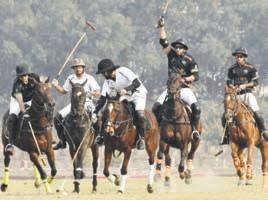
LAHORE: Model Town Whites, City Gymkhana Cricket Club and Ali Garh Cricket Club emerged as triumphant in the 20-K Cup 2023 T20 Cricket Tournament matches played here at different venues on Thursday. All-rounder Naveed Malik excelled in Model Town Whites’ thrashing 9-wicket victory over Yu Slim Club in the 34th match of the tournament. Naveed Malik not only smashed scintillating 59 runs but also clinched 3 wickets for 16 runs to emerge as player of the match. Yu Slim Club, batting first, could score 119-9 in 20 overs. Safeer Azam struck 43 and Amir Jamil 22 runs. Naveed Malik bagged 3-16, Aon Shahzad 2-20 and Shahab Khan 2-28. Model Town Whites easily chased the target in 10.2 overs, losing just 1 wicket. Naveed Malik hammered 59 and Aon Shahzad hit 40. Majid Majeed took the only wicket. Brilliant batting performance by Rana Arslan steered City Gymkhana to a 20-run win over Lucky Star Club in the 35th match. Rana Arslan not only cracked classic 75 runs but also got one wicket that helped him become a player of the match. City Gymkhana, batting first, posted a huge total of 186-10 in 20 overs. Rana Arslan was top scorer with 75 runs while Muhammad Bilal scored 47 and Rizwan Haider 30 runs. M Subhan bowled extremely well and clinched 6-10 while Daniyal Hanif took 2-25. Lucky Star could score 166-8 in 20 overs. Zain ul Hassan slammed 61 while Junaid Ali hit 39 and Zeeshan Khadim 24 runs. StAFF RePoRt
FG/Din
From FG/Din Polo, both brothers Sheikh Muhammad Farhad and Sheikh Muhammad Raffay thrashed in three tremednous goals each while Shah Shamyl Alam and Raja Jalal Arsalan converted one goal each. Raja Samiullah did play well for BN Polo team and hammered a hat-trick of goals while Haider Naseem scored one goal.
FG/Din Polo dominated the match right from the word go as they converted one goal in the first chukker while fired in four fabulous goal in the second chukker to take a healthy 5-0 lead. BN Polo though made their presence felt in the third chukker by scoring one goal yet FG/Din Polo made a good come back and banged in two back-to-back goals to stretch their lead to 7-1.
The highly-charged fourth and last chukker saw BN Polo converting a hat-trick of goals against a brace by FG/Din Polo, who won the match by 9-4. Amirreza Behboudi and Ahmad Bilal Riaz supervised the match as field umpires.
A large number of polo enthusiasts including spon-
sors JS Bank, players and their families and JPF officials were present to watch the match of the eight-goal tournament organized in the memory of Major General Saeed-ul-Zaman Janjua. JS Bank Regional Head Majid Qureshi, Team Leader Zubair Ehsan Khan and Kashif Butt, JPF President Lt Col Shoaib Aftab (R) and others witnessed and enjoyed the match.
Today (Friday), three matches will be played.
Black Horse Paints will take on Pindi Express at 12:00 pm, Platinum Homes/Master Paints will compete Diamond Paints/Nagina Group at 2:00 pm and FG/Din Polo will play against Remington Pharma at 3:00 pm.
Manchester City topped Deloitte’s Football Money League for a second consecutive year as the Premier League accounted for more than half of the top 20 clubs for the first time.

Total revenue from the top 20 revenue-generating clubs rose to near pre-pandemic levels of 9.2 billion euros ($9.9 billion, £8.1 billion) for the 2021/22 season, according to a report published on Thursday.
That increase was largely due to a 1.3 billion euro rise in matchday revenue after two seasons impacted by coronavirus restrictions.
The Premier League’s rise in international television rights sales and strong commercial growth saw 11 clubs from the English top-flight make the top 20 for the first time. Leeds and Newcastle replaced Wolves and Zenit St Petersburg in the only changes to the top 20 from last season.
A 13 percent rise in City’s rev-
enue to 731 million euros saw them retain the top spot from European champions Real Madrid on 714 million euros.
Liverpool rose to third, their highest position in Money League history and above Manchester United for the first time, thanks to a run to the Champions League final, on 702 million euros. United (689 million euros) were fourth ahead of Paris
Saint-Germain and Bayern Munich (both 654 million euros).
Barcelona, who topped the Money League two years ago, dropped to seventh (638 million euros) after crashing out of the Champions League at the group stage and suffering slower commercial growth than their competitors.
Chelsea, Tottenham and Arsenal make up the top 10.
THECentral Power Purchasing Agency (CPPA) has requested the National Electric Power Regulatory Authority (NEPRA) to approve a Rs 2.19 per unit cut in the power tariff on account of fuel charges adjustment (FCA) for the month of December 2022.
CPPA made the request on behalf of power distribution companies (DISCOs) except the K-Electric, and NEPRA is scheduled to conduct a hearing on January 30. Once approved, the decrease in electricity price will provide a sigh of relief to already burdened power consumers.
The CPPA, in its application, has submitted that the total electricity generated with various fuels in the month of December 2022 was recorded at 8,416.81 gigawatts hours (GWh), at a basket price of Rs 7.0441 per unit. The total cost of energy was Rs 59,289 million.
Power generation from hydel was 1,720.43 GWh, or 20.44% of production, while coal-fired plants produced 1,520.93 GWh, or 18.07%, at a price of Rs 11.4954 per unit. Power generation from residual fuel oil (RFO) was 38.91 GWh, or 0.46% of total generation, at Rs 25.7971 per unit.
Gas-based plants produced 1,273.80 GWh, or 15.13%, at Rs10.4992 per unit,
On Thursday, January 19, 2022, the World Bank dismissed the news regarding postponement of $1.1 billion loans. “The press reports that refer to a World Bank decision to delay approval of potential Bank operations in Pakistan are unfounded”, said Najy Benhassine, Country Director of the World Bank for Pakistan on his official twitter handle. The news regarding the disapproval of loans created a frenzy across Twitter and many newspapers on Wednesday. The amount is a two part loan through the second Resilient Institutions for Sustainable Economy (RISE-II) worth $450 million and the second Programme for Affordable Energy (PACE-II) worth $ 600 million. The RISE programme hopes to achieve “fiscal management, promote transparency and private sector growth, and undertake foundational reforms in the energy sector to transition to low-carbon energy,” and the PACE programme sets to “reduce circular debt flow through reducing power generation costs, decarbonising the energy mix, improving efficiency in distribution, and retargeting electricity subsidies,” according to the WB website. Both programmes indicate reforms in the energy sectors, and the WB believes that macroeconomic challenges cannot be met unless energy costs are cut. This includes reducing generation costs, creating avenues for solar energy and cutting subsidies in the energy sector. The government had hoped to receive the approval of at least $450 million by January 2023, which would potentially unlock a further $ 450 million loan by the Asian Infrastructure Investment Bank (AIIB), according to news reports.
compared to power from regasified liquefied natural gas (RLNG) totalling 1,153.73 GWh, or 13.71%, at Rs 20.2071 per unit.
Production from mixed sources was 2.18 GWh at a price of Rs 3.2781 per unit; from bagasse 101.09 GWh, at Rs5.9731 per unit; from wind 211.57 GWh; from solar 69.46 GWh, at Rs 2.7773 per unit.
Generation from nuclear sources was 2,284.86 GWh, or 27.15% of the total generation, at Rs 1.0726 per unit. Electricity imported from Iran accounted for 39.85 GWh at Rs 21.5555 per unit.
Data submitted by the CPPA to NEPRA also showed that net electricity delivered to DISCOs in December 2022 was 8,096.88 GWh at Rs 7.1198 per unit, the total price of which was Rs 57,648 million.

The CPPA in its tariff adjustment request advocated that the reference fuel charges for December 2022, for DISCOs were fixed at Rs 9.3193 per unit while the actual fuel charges were recorded at Rs 10.9833 per unit.
NEPRA, in a public notice, has invited all the interested and affected parties to raise written and oral objections at the public hearing.
Under the law, the regulator may make monthly adjustments in the approved tariff on account of any variations in fuel charges and policy guidelines.
Minister for Planning, Development and Special Initiatives Ahsan Iqbal Thursday said that the government would meet the conditions set by the International Monetary Fund (IMF) to complete the programme, but common man would not be affected by the decisions.
He said the IMF agreement was hanging over the government which it had to negotiate with the Fund. The previous government, he said had recklessly agreed upon the programme, therefore the current government has no option but to continue the programme.
“We have to do lot of adjustments, but we will take decisions in the larger interests of the state,” he said and hastened to add that “we will try to put minimum burden on the poor and common people”.
He was addressing at an event here at the Pakistan Institute of Development Economics (PIDE).
The minister said Pakistan’s economy was in shattered condition when the current government took over and keeping in view the short available time, it decided to take short term measures to turnaround the economy. Ahsan Iqbal stressed the need for mobilizing all available resources to increase productivity and exports of the country so as to get rid of foreign loans on permanent basis.
“Pakistan’s productivity capacity is very low as compared to the standard average”, he said adding that in agriculture sector alone, the country could earn billions of dollars by taking measures to increase the crops’ yield per acre.
For instance, he said the per acre wheat production in Pakistan can be increased by up to 80 percent by improving on-farm management. Similarly, he said, “our industrial production possess numerous inefficiencies due to which we are not competitive
with the world”. The biggest challenge in 75 years, he said is that Pakistan’s productivity capacity could not be integrated with the global markets.
Ahsan Iqbal pointed out that export-led growth is important to resolve the balance of payment issues, therefore he stressed the need to do all measures to earn maximum foreign exchange reserves.
“We have to do resource mobilization and also have to increase tax to GDP ratio up to the global average of over 18 percent which is only at 09 percent in Pakistan”. He said in previous four years, the debt servicing burden had increased to Rs 4500 billion, so if the resources are not mobilized, the country’s all collected tax would be spent on the debt repayment. Furthermore, he said increasing investment was another important factor to ensure sustainable economic development.
“If the Pakistani investors only bring out their money and invest in the country, we will not need to go to the IMF or any other lender”, he said adding that foreign direct investment would also have to be increased up to $25-30 billion per year.
He also asked the Ministry of Commerce to take urgent measures to increase the country’s exports from current $32 billion to over $100 billion in shortest possible time.
Meanwhile, State Minister for Finance and Revenue, Ayesha Ghaus Pasha highlighted that the government wants to continue programme with the International Monetary Fund (IMF) in such a way that the common man should not bear the burden of tough decisions to be made as per the Fund’s condition. Speaking to the media here after attending the Senate Standing Committee on Finance, Mrs. Pasha said that the government’s economic team is having meetings with the Prime Minister to focus on its program with the IMF.
At least 78 people have died of cold in Afghanistan during the country’s worst winter in more than a decade, authorities said on Thursday. Deaths from the cold have been recorded in eight of the country’s 34 provinces, officials said. The coldest winter in 15 years, which has seen temperatures dip as low as -34 degrees Celsius (-29.2 degrees Fahrenheit), has hit Afghanistan in the middle of a severe economic crisis. Many aid groups have partially suspended operations in recent weeks due to a Taliban ruling that most female NGO workers could not work, leaving agencies unable to operate many programmes in the conservative country. “The weather will get colder in the next few days, therefore it is necessary to consider humanitarian aid for affected people,” said Abdullah Ahmadi, the head of the operations centre for emergency conditions at the Ministry of Disaster Management. The UN Office for the Coordination of Humanitarian Affairs (UNOCHA) said last week that the restrictions on female workers were hampering efforts to deliver aid. “Humanitarian partners are providing winterization support to families, including heating, cash for fuel and warm clothes, but distributions have been severely impacted by the … ban on female NGO aid workers,” it said. Even in the early part of winter, health workers had reported a sharp increase in the number of young children suffering from serious cases of pneumonia and other respiratory diseases, in part due to worsening poverty that left people unable to properly heat their homes. Around 77,000 livestock have also died in the past nine days, threatening to deepen the country’s food insecurity. “Lost livelihoods and assets further endanger Afghan families at a time when 21.2 million people urgently need continued food and agricultural support,” said UNOCHA on Twitter.
The federal government expressed its concerns to the Lahore High Court (LHC) regarding the public disclosure of foreign gifts received by officials, known as “Toshakhana gifts.” The government said such disclosure could lead to “unnecessary media hype” and potentially damage Pakistan’s international relations.
The concern was raised in a report submitted to the high court during a hearing for a petition filed by a private citizen, Munir Ahmad, in December last year, seeking to make records of Toshakhana gifts public.
The case centres on a government department known as Toshakhana — which during the Mughal era referred to the treasure houses kept by the subcontinent’s princely rulers to store and display gifts lavished on them. Government officials must declare all gifts to the Cabinet Division, but are allowed to keep those below a certain value. More expensive items must go to Toshakhana under the administrative control of the Cabinet Division, but in some cases, the recipient can buy them back at around 50 percent of their value — a discount Khan raised from 20 percent while in office. The ruling coalition of the Pakistan Democratic Movement (PDM) parties has for months alleged Imran Khan, former prime minister, and his wife, Bushra Maneka, received lavish gifts worth millions during trips abroad. They included luxury watches, jewellery, designer handbags and perfumes.
A fruit and vegetable crisis may be on the cards after the government decided to charge commercial tariffs for the industrial energy connections of cold storages. The concern was raised at a meeting of the All Pakistan Cold Storage Association (APCSA).
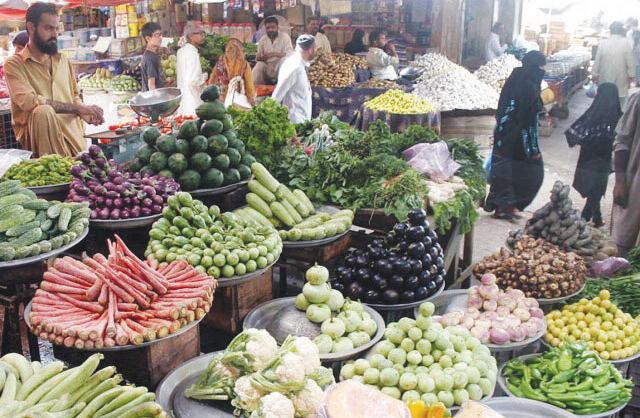
Up until recently, cold storages were given electricity and power at reduced rates instead of at the set commercial tariff. Cold storages are a vital component in the supply chain of perishable goods in the country. The recent decision by the government to gain more revenue by charging the storages commercial tariffs has caused an uproar with the sector.
As a result, a relatively unknown association has come forward to try and de-

mand the government take its decision back. The Central Chairman of All Pakistan Cold Storage Association (APCSA) Rehman Aziz Chan urged the government to withdraw the decision of moving the industrial connections of cold storages to commercial tariff. “This move will increase the price of stored items by Rs2.50 per KG as the motors are installed in the cold stores which are registered as Industry entities.This sector is 100 years old and for the first time, this association has come forward with its demands after being registered,” Rehman told Profit.
“With this measure, vegetables and fruits will become many times more expensive and the farmers will not store vegetables and fruits which will create food security challenges in the country and a new crisis will arise after flour. In terms of population in Pakistan, cold storages are al-
ready many times less which instead of increasing, are decreasing now. The government should solve this problem immediately,” he lamented.
He said that at present, food security is a huge problem in the country as about 2 million tons of potato is stored in the cold stores for one year. “Apart from this, other fruits and vegetables are also stored in the cold stores which is a huge number for the food security of Pakistan. This year, All Pakistan Cold Stores Association has set a rate of Rs 980 for the entire of Pakistan for the first time in its history.”
”This rate includes an escalation clause. That is, if the increase in the electricity rate is more than five percent, the farmers will be charged an additional rate. This rate will be assessed every quarter and these fruits and vegetables are stored in it for one year,” he concluded.